#george is most certainly a page of some kind
Text
these casts would make the best fucking sburb sessions
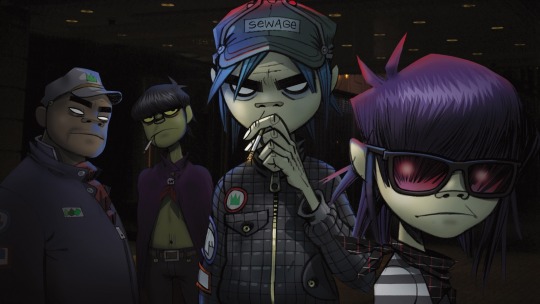
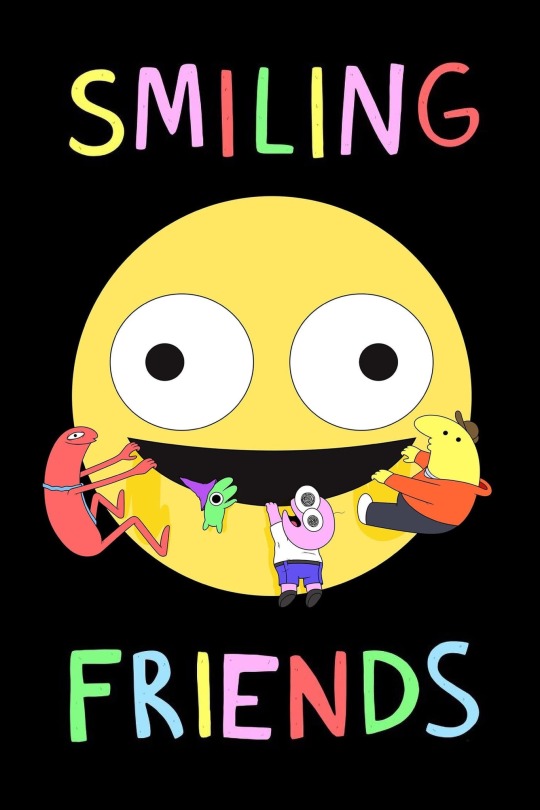
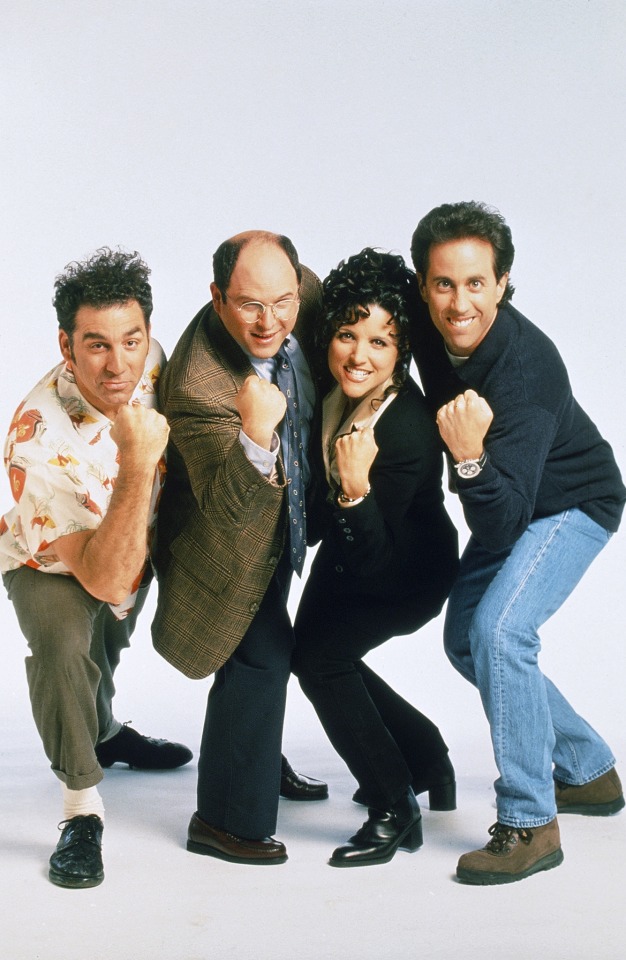
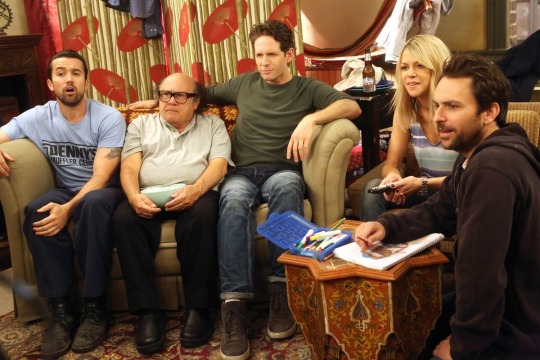
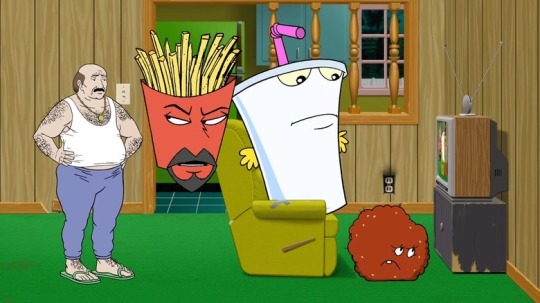
#homestuck#master shake contributes nothing and dies a just death against the black king#george is most certainly a page of some kind#murdoc is bard of doom#mr boss is a guardian and is captured by the derse kingdom#smiling friends#seinfeld#frank is getting prototyped but you already knew that#aqua teen hunger force#carl dies and frylock gives him a robot body like aradia#gorillaz#always sunny#always sunny in philadelphia#sitcom#sburb session#sburb#shitpost au#aqua teen forever#homestuck au#homestuck shitpost
23 notes
·
View notes
Text
Appendix D: Some Pig/One More Final
The first three posts in this series are here.
Undertale was a slightly postmodern children's fantasy movie produced by Jim Henson's Creature Shop in the '80s. Noah Hathaway played the protagonist, Frisk, who went on a long quest to escape from a magical prison inside Mt. Ebott; Frisk's father had thrown them into the mountain, known to be full of monsters, in an attempt to kill them. However, it's suggested that as a human, Frisk is inherently more of a protagonist than a monster can be, and has a vague sort of magical power over them. Toriel's death, which Frisk accidentally causes early in the movie, is commonly listed as a Peak Sad Childhood Moment.
George Orwell wrote The Writing In The Web, a political fable about a cult started by a well-meaning spider. E. B. White wrote Snowball's Farm, a whimsical children's tale about a farm whose animals decide to take over.
Infamously, Emmanuel Goldstein's monologue fills dozens of pages, takes at least three hours to read aloud, and brings the plot of Ayn Rand's 1984 to a screeching halt.
Short story collections and anthologies often keep the same title, author, and spirit, it's just the stories that are swapped out. For example, classic episodes of Rod Serling's The Twilight Zone include A Wonderful Life, The Secret Life Of Walter Mitty, Miracle On 34th Street, and The Sixth Sense. 1983's The Twilight Zone Movie includes segments based on classic episodes Eternal Sunshine of the Spotless Mind (directed by John Landis and given anti-war themes), Cocoon, The Poltergeist, and In Search of the Twelve Monkeys (the original starred a young William Shatner). Candle Cove is an episode of Black Mirror.
League of Extraordinary Gentlemen was a 1999 Ben Stiller comedy about a team of low-rent superheroes who theme themselves after public domain characters because they cannot afford licensing fees. The film was well-reviewed, but a box office bomb. It was actually the first film to use Smash Mouth's One Week - the One Week music video is actually cross promotion with League of Extraordinary Gentlemen - and it would remain the film most associated with the song until Dreamworks' Happily N'Ever After hit theaters two years later.
The Amazing Digital Circus was a virtual pet game and toy line that struck when the iron was hot on that niche, before being bought out by Hasbro and rebooted a few times in different forms and mediums. Lauren Faust created a long-running television cartoon of it that was a huge smash hit with fandom culture despite the show's clearly very young target audience. The property's canon is all very light kiddie fare; the scariest thing about The Amazing Digital Circus is that for a brief and touchy stretch of time in the early 2000s, it was owned by the Peoples Temple, which was seriously considering turning it into a recruiting platform.
Your cringe unpublished works that you gave up on were almost certainly swapped around with other people's cringe unpublished works that they gave up on. There's lots of upwards and downwards mobility to the scramble, but not usually that much. Exceptions are very rare - like a beggar suddenly being made king, or a god being reincarnated into an ant - but they do occasionally happen. For example, what you know as the land of Oz exists only in the head of a young Milwaukee stoner, who suddenly came up with the idea for an epic graphic novel one day in the 2010s while sitting on the bus, and spent a couple of years absolutely convinced she would eventually make it. (She cannot draw.) Conversely, L. Frank Baum's children's fantasy series, Enormia, which has been adapted and reimagined many times, most notably as audiences' introduction to color film, exists in your world only as a different Milwaukee stoner's overly elaborate backstory for his jerkoff sessions. This kind of thing is much more the exception than the rule, and even such exceptions are almost always much smaller in scope - an obscure stillborn project getting swapped around with an obscure out-of-print novel, or an obscure direct-to-video z-movie.
The True Detectives forum and its many schismatic spinoffs, all of which are devoted to discussing mystery fiction, host literally thousands of Wind fanfics. Many of the writers - perhaps most of them - have never actually read Wind, just other fanfiction of it; next to none of the fics are worth reading. Most Wind fics reuse the original protagonist, Rorschach, but treat him as a generically relatable blank slate. The most common fic format by far is the "altdunnit", a form of what-if scenario in which the mystery that sets off Wind's plot is different in some way.

Rorschach is held by a substantial portion of the fandom to be an egg (a trans woman who has not realized it yet). Wildbow has never endorsed this interpretation, and it doesn't seem to be much on his radar. In recent years, the trans Rorschach portion of the fandom has grown; they don't tend to look especially kindly on Warn, much of which Wildbow wrote as a response to fans (like those on the True Detectives forum) he felt had been too inclined to take Rorschach's side in Wind. Flame wars over Warn's content were constant throughout its serial publication, and made it easily the rockiest experience of Wildbow's writing career.
Some noteworthy and relevant podcasts include Jonathan Sims' The Dresden Files, the Ranged Touch Network's Scott Pilgrim Made The World, Doof Media's Winding Down (later Warning Down), and the McElroy family's The Adventure Zone (an actual play podcast which has currently had three major campaigns, two anthology series, and various one-shots). Film Reroll is still an actual play podcast that runs the basic setups of movies (and occasionally other media) as short tabletop campaigns; occasionally, their version of a movie will be much closer to ours than it is to the version of the movie in their own universe.
Xenobuddy was an early childhood public access show, originally created for the BBC in the late 1990s but later aired internationally. The title character is a small alien puppet who lives on a futuristic spaceship staffed by children (who speak a vague conlang akin to a dollar store Esperanto). At the end of every episode, it gets lost and is found, usually by (harmlessly) bursting out of one of the children. It was very popular with its target audience and much loathed by parents. Edgy ironic fanart depicting the titular Xenobuddy as some kind of dangerous parasite abounds.
Static is a supernatural slasher franchise created by Wes Craven, with the first film, also simply titled Static, released in 1984. The movies concern a group of gibbering neotenous ogre-fae who wake up in the modern day after a long sleep, incorporate televisions into their bodies, and start eating people by sucking them into hellish pocket dimensions. The Screen-Guts collectively are probably in the top five antagonists most people think of when they think of slasher horror.
Toby Fox's ROSEQUARTZ is especially known for its meta take on video game morality systems. The game has a mission-based structure; throughout it, the player is encouraged to take on a pacifist playstyle, championed by the player character's late mother, the title character. However, the Crystal Gems give the player enough autonomy that you are entirely able to take a much more violent tack; doing so has a rippling effect on the game's writing in countless immersively-integrated ways. If the player goes out of their way to be as murderous as possible - the so-called "genocide route" - the differences from the main route grow much more extreme, and rather than gaining allies, you start to lose them, as the Crystal Gems realize what you're doing and one by one turn against you. If you manage to shatter Garnet - it's the hardest and most iconic fight in the game, Megalovania is playing, her Future Vision gets used for all it's worth - then you use your knife to slash at the cosmos, erasing Earth, Homeworld, and everything else. This, Toby Fox is saying, is apparently all you want out of a video game - another toy to break.
Warner Bros still did Space Jam with Michael Jordan and the Looney Tunes, it's just that the Looney Tunes in question were Mickey Mouse and friends. They also still did a second one with LeBron James, which was, by God, somehow worse. They put Ms. Frizzle in it.
Walt Disney made his squeaky clean reputation on the back of adaptations of things like Rudyard Kipling's adventure novel The Call of Cthulhu, P. L. Travers' Thomas the Tank Engine, and Erich Kästner's feel-good coming-of-age kidnapping tale about the power of perseverance, Lolita, originally done with Hayley Mills and later remade with Lindsay Lohan.
Nabokov's extremely controversial literary classic that has defined the idea of the unreliable narrator is Father's Trap, from the perspective of a man who plots to obtain custody of both of his daughters for nefarious purposes. Most publishers ignored Nabokov's instructions not to depict the twins, Lisa and Lottie, on the cover. Stanley Kubrick and Adrian Lyne have directed mediocre film adaptations, and songwriting team Lerner and Loewe did a musical that was a legendary flop.
The Japanese fashion movement is Gothic Pollyanna, after an otherwise-forgotten series of penny dreadfuls about a cute, cheery, rules-minded young girl who is, despite appearances, an insane criminal. Minor character Bonesaw in Alan Moore's Worm Turns also clearly hearkens back to the Pollyanna stock character.
The DEA was a prime-time soap opera about the ongoing "war on drugs"; it ran for eleven seasons from 1982 to 1993. Its plot focused on federal agents working at the Drug Enforcement Administration office in Albuquerque, New Mexico, and especially partners Hank Schrader and Steve Gomez and their families. It is mostly remembered today for its downer ending (in which the treachery of late-show villain Walter White, or "Heisenberg", gets the leads killed, and he escapes from justice), and for its far-more-acclaimed spinoff series Better Call Saul, which also ran for eleven seasons from 1993 to 2004, functioning as a prequel, midquel, and sequel to The DEA.
Between The DEA and Better Call Saul, Kelsey Grammer played crooked lawyer Saul Goodman for twenty consecutive years of primetime TV, first as featured comic relief and later as a leading man. (He also guest-starred on the mostly-forgotten Mall Cop, establishing that it, too, was set in the world of The DEA and Better Call Saul.) Better Call Saul won more than a dozen Primetime Emmys. Peri Gilpin received several of these for her performance as Kim Wexler.
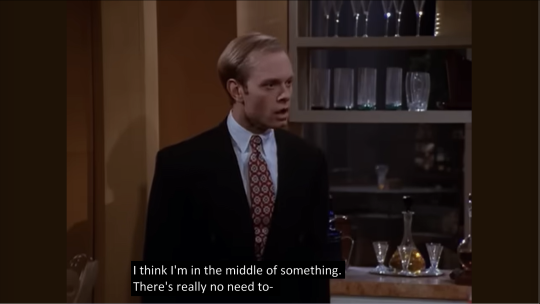
St. Elsewhere was a film written and directed by M. Night Shyamalan in the late 1990s; it was highly acclaimed and successful, and established Shyamalan in the public eye as a skilled auteur with an affinity for twist endings. The film's final scene reveals that its main setting, St. Eligius Hospital, exists entirely within the imagination of an autistic boy, Tommy Westphall, as he gazes into a snowglobe. The so-called "Tommy Westphall Universe Hypothesis", which posits that this same twist applies to most of fiction due to a network of crossovers, was invented by a Saturday Night Live sketch shortly postdating the film's release, in which an amnesiac Charles McGill (from Better Call Saul) wakes up in St. Eligius, attended to by a cast of characters who are more concerned with their own nonexistence.
After rising to prominence as a writer, storyboarder, and composer for Pendleton Ward's Science Time (where she established the Summer/Jessica relationship that would come to define later seasons), Rebecca Sugar got to make her own cartoon, Henry Ichor. Set in a recently post-apocalyptic but strangely cheerful world, Henry Ichor concerns a young teenage boy who is conscripted as a mech pilot due to his rare and innate ability to link to the powerful Evangelion mecha. (His preferred Evangelion is eventually revealed to be a form of his late mother, the reason he can do this in the first place.) Henry turns out to be a vital asset in protecting humanity from the monstrous "Angels" that frequently threaten it, and is surprisingly emotionally mature for his age. However, the adults around him (especially his father, Gennady) frequently push him too far, especially considering his generally noncombative and pacifistic nature. There is much interpersonal drama and much singing about it, with a very vocally trained cast. After several seasons of slow buildup, the show was forced to suddenly rush to its ending in only a few (infamous) episodes after an arc where Henry had a romance with an Angel in male human form. Henry Ichor The Movie and an ensuing miniseries, End Of Henry Ichor, helped bring the show to a more thematically satisfying conclusion.
Although he has played a creative or consultant role in many animated projects, Alex Hirsch is best known for the one he was actually the showrunner for, Disney Channel's smash hit Sunnydale. Focusing on a small California town constantly plagued by supernatural threats, Sunnydale generally followed a simple monster-of-the-week format, but kept audiences on the hook with teases at a deeper underlying mystery. The show almost didn't get a season two, as Hirsch found working with Disney very tiring, but he was eventually persuaded; season two ran through the rest of Hirsch's ideas at a faster pace, and concluded the show with the leads graduating from Sunnydale High.
For a brief historical moment, Daron Nefcy's show, Ender vs. the Space Bug Army, looked like it would become the successor to Sunnydale, keeping Disney Television Animation prestigious after Sunnydale ended. However, though Ender drew in a big crowd, and lasted almost twice as long as Sunnydale, it was not ultimately as well-received. EvtSBA is a children's space opera, wearing its Starship Troopers (Joss Whedon) inspiration on its sleeve, but also clearly copying some (superficial) notes from Philip Pullman. Set in a future where mankind has come into violent conflict with bug-like aliens, the show follows unbearably smug boy supergenius Ender as he is sent to military school to prepare for interstellar warfare. The show has an extremely cutesy and hyperactive tone; typical filler episodes include the one (generally taken as meta about fandom drama) in which Ender's siblings' futuristic internet arguments prove instrumental to the survival of the human race. Later seasons get a bit more serious, but focus heavily on shipping. The show is infamous for its ending, in which Ender, for his final exam, destroys the Formics' home planet and releases a psychic signal that eradicates the Formic race. Although the show explicitly notes that this includes many individual Formics who we have previously known as sympathetic characters, it is nonetheless played as a happy ending in which a hostile colonial power is defeated. Ender has ended the war; he has beaten the Space Bug Army.
"Meugh-Neigh. 'Meugh' like the cat, 'neigh' like the horse."
"Does it mean something?"
"No answer; none at all."
Orson Scott Card is an extremely prolific author of speculative fiction. Although it isn't as close to his heart as the Steel Gear series, in which he got to flex his military sci-fi muscles and allegorically retell stories from his faith, he is undoubtedly best known for Ishtar's Curse. Initially a short story and later expanded into a full novel, the plot concerns young Princess Ishtar, or Star, heir to the heathen fairy kingdom of Meugh-Neigh. (In later novels, she changes her name to Bethlehem Diaz, or Beth.) Spoiled and destructive but magically talented, Star is sent to twentieth century Earth so she can develop the wits and the strength of character to be a viable wartime leader for her people - or at least so she can be kept out of the way. After several years of personal growth and magical misadventures with companions she met on Earth, a more grounded Star devises a spell to erase the magic that makes up the bodies of most of her throne's enemies. This plan works, and merges Meugh-Neigh into the Earth as a small and ordinary European country. However, though her subjects are eager to celebrate her for this, Star is devastated when she realizes that she has killed trillions of innocent spirits, and, seeking to atone, she takes on the title of Speaker for the Dead (also the title of the book's first sequel). Although it's frequently ranked highly in lists of fantasy novels of the twentieth century, Ishtar's Curse has received some harsh criticism, with the standard line being that Star is an idealized fantasy of a repentant Hitler figure, and that the text presents excessive justifications for her actions. The story has also been called a reactionary response to Wilde's The Little Mermaid. After more than twenty years, a film adaptation of Ishtar's Curse was released in 2009, starring Dakota Fanning, to mixed reviews. The box office took a further hit due to a boycott campaign, after Card's views on homosexuality (and, relatedly, his membership in the LDS Church) became widely known. In the end, it lost the studio a lot of money.
Hideaki Anno is best known for the classic smash hit anime he made for Studio Gainax, Einstein Goliath Nestorian, a psychologically intense deconstruction of martial arts shonen like Yoshiyuki Tomino's Dragon Ball. Einstein Goliath Nestorian concerns a mystery man known only as Saitama, who finds that he has become dissatisfied with life and alienated from the world after only three years of training have enabled him to easily surpass any physical challenge. The original series is known for its sudden, surreal, and clearly budget-driven ending, although this was quickly alleviated with a similarly surreal but more definitive finale movie. Although many Western anime fans often think of Einstein Goliath Nestorian as pretentious and ultra niche, it was actually a huge mainstream hit in Japan, with a colossal franchise of adaptations, merch, and spinoffs (notably including a series of Retrain films, which began as extremely close shot-for-shot remakes of the original series but wound up spiraling into a very different updated timeline).
Previously most noteworthy for his 2003 visual novel Oreimo, Gen Urobuchi was tapped by Shaft for their extremely successful and acclaimed anime Ohayou Hana!, hailed as a deceptively dark deconstruction of the teen idol genre. The plot concerns a girl, Saionji Mayuri, who leads a double life, being of little note at school, out of costume, but spending much of her time as #1 idol Hana. Her mental stability begins to deteriorate as she realizes that the adults in her life - especially her father, himself a former idol - have groomed her to serve as a drugged and hypnotized propaganda mouthpiece for a shadowy conspiracy. She winds up in the worst of both worlds as her ensuing breakdown, and her handlers' response to it, destroys both of her lives and brings ruin to those she cares about. In addition to the popularity of the actual anime, many of its songs became decontextualized J-Pop hits. The idol anime genre would then receive a glut of edgy lesser imitators, like Love Live: School Idol Project, Cheetah Girls, and magical girl fusion Symphogear. Although the original Ohayou Hana! was a self-contained twelve-episode story, it received a sequel movie shortly thereafter, Ohayou Hana! Rebel!, which ended on a cliffhanger that has still not been resolved over a decade later. The upcoming Ohayou Hana! MK Ultra! is expected to get things back on track. An abridged series originating on 4chan, focusing on cropped screencaps from Ohayou Hana!, called the title character "Miss Ohio", producing the memetic tagline "being Ohio is suffering".

Zack Snyder first came up with the idea for Madoka around 2000, a long time before he'd actually get to make it; he put the project on hold in 2006 to make his adaptation of Worm Turns. He developed the idea with his wife Deborah and a cowriter, Steve Shibuya. Inspired by the Disney Princess phenomenon, as well as Naoko Takeuchi's Pretty Cure (one of the few anime that had already become a hit in the States), Snyder wanted to tell a coherent story about fights between magical girls who could make anything happen, who could make any fantastical world or visual appear. In Snyder's film, we follow Madoka Kaname, a teenager attending a Catholic school in Los Angeles. Madoka and her friends are approached by a strange young woman who goes only by "Mommy", and her animal companion (a CGI-ed up squirrel-cat thing), QB. They offer to make the teens into "magical girls", granting them one wish each in exchange for a life devoted to spiritual warfare. (Another mysterious new girl, Lilly, urges them not to take the deal in the strongest possible terms.) This turns out to be a scam; QB is pitting the magical girls against one another for his own reasons, and in the end, every magical girl and her wish gets corrupted. Despite much of the film's plot being a horrific bloodbath - the MPAA demanded a lot of cuts to get it down to a PG-13 rating - there is a happy ending; Madoka finally makes her own wish and uses it to topple QB's whole system. Madoka isn't often discussed nowadays but it was a major discourse bomb when it came out in 2010, alternately being called misogynistic Orientalist trash and a subversive feminist masterpiece. Snyder, for his part, often notes that QB is intended as an allegory for exploitative forces within the entertainment industry that treat young women as disposable resources with an expiration date; this is already clear to anyone who's watched the film, which is not exactly subtle in its symbolism. He also explains that the film sexualizes the girls in an effort to shame the audience, to get people to understand that they are objectifying the characters in the same way that QB does. The soundtrack's got a really cool ethereal cover of Nine Inch Nails' King Nothing on it, which is probably the most remembered part of the film today.
Selena Gomez became a star by playing Violet Parr on Disney Channel's superhero sitcom The Incredibles. While the show was initially a very throwaway villain-of-the-week affair whose leads had to keep their powers hidden from the public and their caped escapades secret from the government for self-explanatory comes-with-the-genre reasons, it would eventually unfold that the show was set in something of an X-Men-style dystopia where superheroism had been outlawed and supers oppressed by the government as a potential societal fifth column.
Brad Bird directed one of Pixar's most celebrated films, Wizards of Waverly Place; it was Pixar's first film with a predominantly human cast. Disney was hungry for a fantasy property after losing a bidding war for the Luz Noceda rights. It had strong populist anti-eugenic themes, with an elaborate wizarding hierarchy of antagonists who seek to remove the Russo family's magic as part of an effort to curb wizard overpopulation. The sequel came more than a decade later, and wasn't nearly as good.
In addition to Worm Turns, Alan Moore is notable for the heavily metafictional comic Pagemaster, about a boy, Richard, who finds a magical library that contains all stories that have ever been or could ever be told; he becomes lost and imperiled in assorted pieces of historically noteworthy literature (initially ones in the public domain, though later volumes would start using legally safe serial-numbers-filed-off versions of modern stories). The 2003 film, in which Sean Connery played the librarian in one of his last film roles, is widely regarded as a terrible, deeply-toned-down adaptation that didn't grasp the tone or themes of the original story at all; it only covered the first half of the first volume, in which Richard meets "genre spirits" who wish to sort all stories into rigid categories. In a later volume, Pagemaster Millennium, an aged Richard Tyler, who has since taken on the mantle of librarian himself, meets a teenage girl, heavily implied to be Luz Noceda, who has also become lost in the library. She has become corrupted by an eldritch book, or "Necronomicon", written by "the Wrong Author", heavily implied to be the devil (and/or Hugo Astley, an Aleister Crowley caricature from W. Somerset Maugham's The Winged Bull). Flushed with demonic power and enraged by what she's become, a monstrous Luz tears through the library in a blaze of hellfire, seeking to destroy all of literature and the world. It is only through the intervention of the Fat Controller - heavily implied to be God - that Luz is defeated; he mercifully erases her by hitting her with a train, and laments what she became.
#queued post#the scrambled timeline#I tinkered around with the ordering of these entries so much that I guess this is a scrambled post for the scrambled timeline#credit to hieronymous-botch for the Alex Hirsch's Sunnydale idea#credit to Lorelei for the Orson Scott Card's Steel Gear idea
118 notes
·
View notes
Text
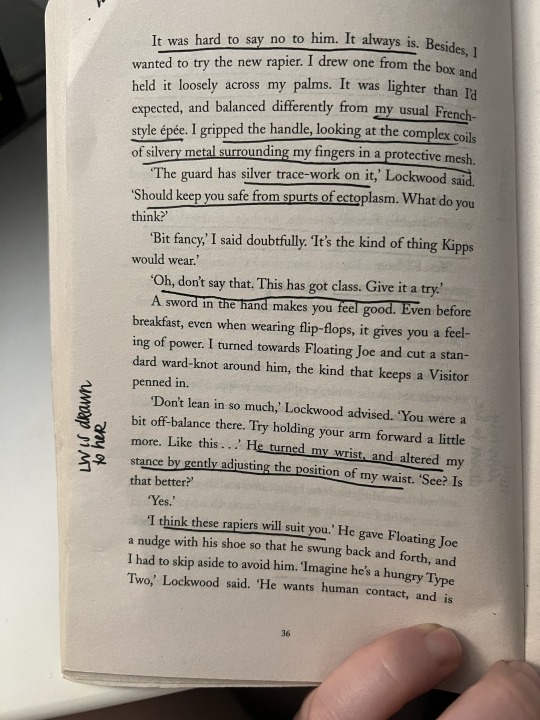
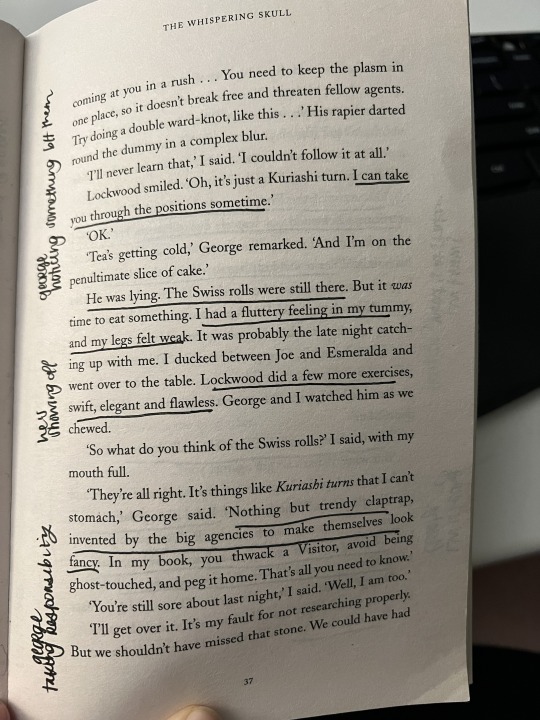
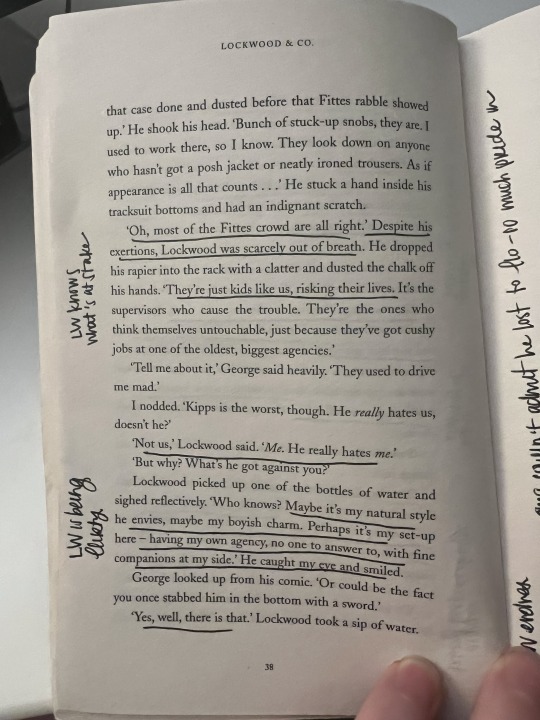
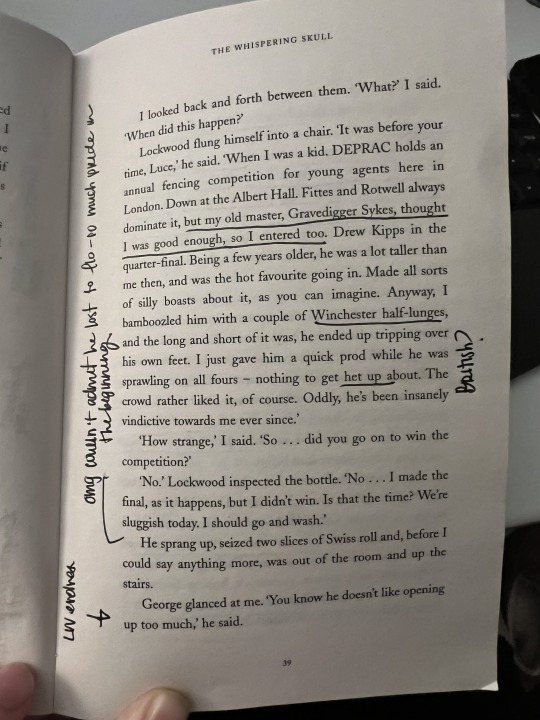
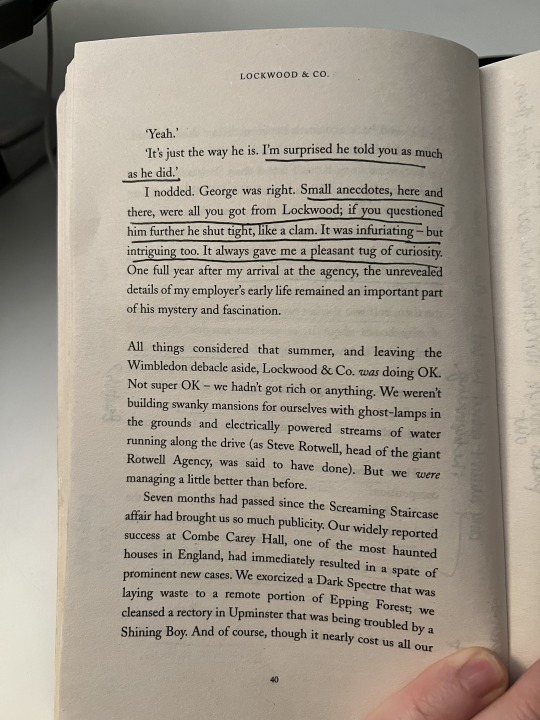
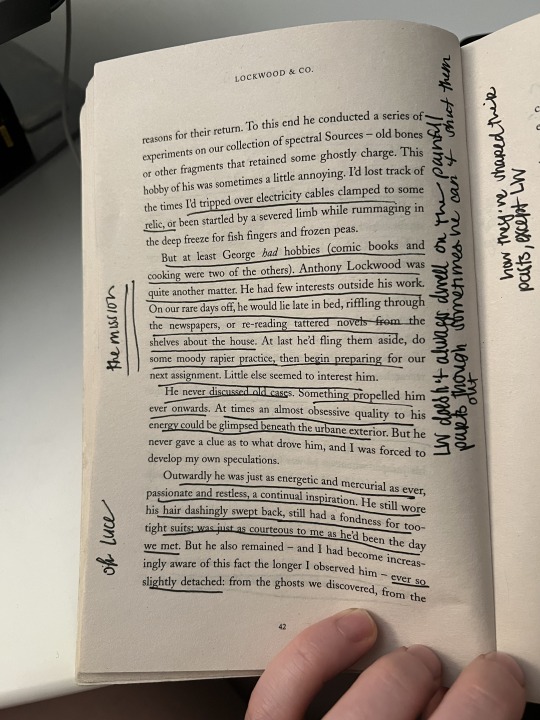
I'm sure I'll post more TSS, but for now, have some Shel thoughts on TWS (featuring the British editions, because why deal with the silly American ones, when you can have 3 versions of the books - digital, US paperbacks and English paperbacks? Stroud, you're welcome ◡̈ )
(Clearly, I had trouble prioritizing what passages to pick, and the last one is prime example of how not to highlight, since I underlined the entire page.)
I love these scenes though, because as I've mentioned before, we know that Lockwood and Lucy liked each other very early on, but I think this is one of the first instances we see Lockwood wrestling with his feelings and backing down from them as a result. @dangerously-human posted a brilliant analysis on Lucy's denial of her feelings for Lockwood, and here we see Lockwood grappling with the same denial and ultimately forcing himself to refocus on the mission, as a result. (Side note: When Lucy tells Lockwood they're so similar in the beginning of TEG, it's like yeah, you two are both idiots.)
I get it—Lockwood has lost everyone he's loved, so any feeling close to that, he's going to push back on, because to love someone might mean he'll lose that someone. Isn't that what life has taught him (and yet!! the wonderful miracle of Lockwood is that he just keeps on loving... kind of like my dear ol' boy Harry Potter)?
He legit knows Lucy is watching here, and he's totally showing off for her. When has he ever demonstrated a move like this to George? No, Lockwood is totally flirting with Lucy during this scene.
But then, Fittes comes up. We get a reminder that this isn't any world, despite how immune our heroes seem to be to its horrors sometimes. Lockwood recognizes that ultimately every agent is just a kid risking their life. This is important, because while Lockwood is certainly starting to blur the lines with Lucy, at the end of the photos I've taken, he pulls back. Why? The mission.
He's a kid with a horrible past. In TEG, he mentions that it seemed random—his parents, Jessica— but it wasn't. Up until now, it almost borders on revenge. Obsession. He doesn't have hobbies. He refuses to dwell on the past. He spins and thinks and strategizes about the next case, and then the one after that. He has no sympathy for ghosts. He wants to end them—all that matters is the mission, for the pain it's caused him, for some of the emptiness it's left him.
But then there's Lucy. He gets sidetracked. We even have George noting here that he's surprised that Lockwood has already told Lucy this much. And yet, he still holds back. We don't know who beat him at the Fittes tournament, and he doesn't tell Lucy until TEG.
He's completely in denial here, and even though we see him open up slowly, he still always orients back to the goal at hand, as he continues to struggle with his feelings for Lucy. And so consistently, he refocuses and pushes them aside.
Until we see that he can't after Lucy leaves—how wrecked he was without her. And it isn't really until this point that he truly, really starts to open himself up to her—not his past, not his thoughts as a leader, but himself and how he feels about her.
He takes her to his families graves in TEG, and if that's not a sign of vulnerability, trust, and faith, then I don't what is.
But what I find the most interesting? We don't get that Flo backstory from Lockwood until much later, after the graveyard. Huh. And it comes after Lockwood realizes that his parents didn't die in a random car crash—almost like his life wasn't random at all.
I actually think it's kind of huge that Lockwood saves this last piece of information for last. Because it's a funny story that's meant to cheer Lucy up. Defeating Marissa is important, but it's no longer about the mission at this point. Not really, not anymore. He's found peace with that. It's about Lucy, and I think, in this moment, he fully and 100% accepts his feelings towards her.
Yes, you can argue it happened when he tried to give her the necklace the first time, and it was Kipps who interrupted them, and blah blah blah. But Lockwood could have found a way to give Lucy the necklace again before the attack on PR. But he didn't.
And isn't it interesting that the undying devotion necklace is something still tied to his family? But the Flo story and how she beat Lockwood? Nah, that's all Lockwood, and it's something of him—without the weighty ties to his family, still somehow so wrapped up in the Problem—that he shares with Lucy. And it's this innocent moment, this moment of joy, that's so inherently pure and lovely, and largely unrelated to the bigger threat, that sigh, my heart. This to me, this is the moment. And all these other moments, I've highlighted above set us up for this.
#lockwood and co#lockwood & co#l&co book spoilers#anthony lockwood#locklyle#lucy carlyle#tws#teg#thb
76 notes
·
View notes
Text
While we’re here. Here’s a canon hair/eye color chart. With evidence.
Nick: Blonde/Blue/Green
the evidence is very marginal and I usually disregard it, but it does say:
“This idea is that we’re Nordics. I am, and you are, and you are, and—” After an infinitesimal hesitation he included Daisy with a slight nod..."
'Nordic' was eventually coopted by the Nazis as a companion word to their Aryan bullshit, and in 1924 (when this part was likely written) there were even some measures to separate 'dark whites' (Italians, Jewish people, etc) from 'lighter' white people. All bullshit, but all this to say the implication at the time of writing would have meant light hair and light eyes.
Also. Fitz had blonde hair and blue eyes and we know about this fucker and his self-insertion. Like I said I usually ignore this but it is kind of funny because I have never once seen a representation of nick with anything other than brown or black hair
Jay: Blonde(?)/Blue
This comes from the Princeton holograph. since fitz decided to deprive us in the final product.
For his hair: "...his bright suit and hair..." (pg 139). jay's suit is caramel colored in this scene so the closest I can imagine is that his suit and hair are of a similar color, like perhaps a reddish blonde at most but certainly blonde at the very least, if the description lends to anything.
Fitz wrote as follows in regards to Jay's eyes: "...at a table with a handsome blue-eyed man..." (pg 103); "...the blue-eyed man looked at me..." (pg 103); (he also calls them handsome eyes on page 105.......); "dark blue eyes opening out into lashes of shining jet" (pg 105); "...with such a wild look in his blue eyes..." (pg 115); "...his eyes, damp and shining like blue oil..." (pg 131); "...damp and shining like blue oil..." (again) (pg 137); and i think that's enough thank you scott
Daisy: Dark(?)/??
There's two bits of evidence, mainly, for Daisy's dark hair. I'm assuming it's dark brown but that's just me. First is the whole 'Nordic' bullshit thing, where Tom is hesitant to include Daisy in the 'Nordic Race' or whatever, which would imply that she has darker hair. Also, Fitz directly confirms this with the line "...and once he kissed her dark shining hair." HOWEVER. Daisy does say that Pammy has her hair, and Pammy's hair is 'yellowy'. This is even weirder considering Tom is remarked as having 'straw hair', as in blonde. So. Maybe we CAN'T rely on the alcoholic for consistency.
Daisy's eye color is not remarked on, just that they're bright. So maybe light. but who knows.
One other note is that Ginevra King, the woman Daisy is based off of, had dark brown hair and eyes.
Jordan: Blonde/Grey
This one is easy, thank god. As for her hair, it's written "...autumn-leaf yellow of her hair..."; and again "...her hair the colour of an autumn leaf..." girl get a toner. and also the forementioned Nordic bullshit argument. Jordan was included with Tom and Nick.
Her eyes: "Her grey sun-strained eyes..."; "Her grey, sun-strained eyes..." (again)
Again, the direct inspiration for Jordan is Edith Cummings who had, shocker shocker, blonde hair and grey eyes if a period-appropriate painted color portrait is to be believed.
Tom: Blonde/??
For his hair he's described as a "sturdy, straw-haired man of thirty". the argument could be made that that is more in regards to the texture but knowing fitz it probably means that tom is also. blonde. you'll start to notice a pattern.
As for his eyes, all that's really mentioned is that they are shining and arrogant. no color
Tom is based off a few people so I won't rely on any of them for hints or clues.
George: Blonde/Blue
This one is pretty cut and dry. "He was a blond, spiritless man, anaemic, and faintly handsome...hope sprang into his light blue eyes."
Myrtle: ??/??
If you can find written evidence for myrtle having red hair I'd love to see it because I've been searching for a while now and I can't find it in any draft. It's a movie thing, I guess, like switching jordan's and daisy's hair colors around in lazy deference to eurocentric beauty standards and a pitiful attempt at acknowledging fitz's penchant for color-based symbolism <3
The only clue for Myrtle having red hair is that her sister does. SO maybe she does, too. Her eyes are a mystery.
Klipspringer is also blonde and balding, too. God's least favorite creature I guess.
so it's safe to say that fitz just loved making everyone blonde. like, everyone. and considering that he himself said that all of his characters were just him, that makes an unfortunate amount of sense.
#the great gatsby#jay gatsby#nick carraway#jordan baker#daisy buchanan#look. i am so normal about this#and so definitely not mad at the filmmakers constantly mixing up jordan and daisy <3#not like any of this matters.#whatever.#this isn't against aus where they have other colorations either it's just for canon's sake
27 notes
·
View notes
Note
Could you do some headcanons for Gary or Trent, and my oc, Suki? Thanks if U do!
Yesss ofccccc Gary and Trent will be posted now and ill give suki her own special post ^v^
TRENT NORTHWICK & GARY SMITH HCS
GARY SMITH
Gary…. Gary Gary Gary oh how you were so so so wasted by not being in free roam. I guess if i strain i can kinda see why he wasn’t around because, naturally people would incessantly kick the shit out of him
Biggest gossiper in the school, knocks Christy out of the park. He’s really really good at starting rumours because he knows just the right amount of ludicrous bullshit that needs to be added in order to make people want to spread it, while not having it die off by making it completely and utterly bonkers.
The slouch is definitely purposeful, he thought that standing up too straight would make him look too nerdy so he defaulted to this sort of weird grinch/ dr doom pose, he pays for this decision with really bad neck and upper back cramps but he’s simply too cool for meds of any kind including pain meds. Often what he does to get a kick out of Petey is to crack his neck really close to his ear ans laugh as poor Pete squirms in discomfort.
Got stuck in the Regina George headgear/back brace combo after jimmy threw them both of the roof into crabblesnitch’s office after the final showdown. He was in the hospital for a good long while, recuperating and making up for lost time on his meds before he was carted off to happy volts
Wrote down every single aspect of his plan for total bullworth domination in excruciating detail in a notebook that he kept tucked under his mattress, the first page was entitled “GARY’S EVIL PLAN” in all caps, in a heavy metal font, in red sharpie that bled through the next few pages. He would add to it nightly, and check stuff off when he was done with it. Insanely stupid and equally, insanely funny.
Doesn’t actually talk that way, like at all, its very much an act that he uses to make himself seem all cool and mysterious. He’s only ever slipped once or twice, and then instantly got on the defensive and gaslit whoever heard him (most likely poor Pete) its commitment to the bit that most could only dream of obtaining.
Got in so much shit for his special little bullworth vest, its technically not in violation of any uniform policies, a fact that he valiantly defended against the prefects, the faculty and everyone else that questioned it until they eventually just let him off with it.
Definitely a promising young politician if they decide he’s stable enough to leave happy volts, he’s charismatic, not terrible with words, and just generally immoral. He’s the perfect politician for the modern age.
TRENT NORTHWICK
Trent Trent Trent,i know a theatre kid when i see one. Definitely big on the more modern stuff compared the the older musicals, he just prefers the style of singing a little better, he finds it more expressive. However, he’ll take west side story over hamilton any day, dont get it twisted.
He saves money as best he can and goes to voice lessons pretty regularly, as well as intermittent dance lessons. He knows to make it in Hollywood you’ve got to be a triple threat and he certainly does plan to be a triple threat when he eventually runs off into the sunset to pursue his dream of going to audition after audition until he eventually lands himself a starring role in an allergy medicine commercial
Takes pride in his appearance, every few weeks he bleaches his roots and trims his own hair. He’s the only one that knows how to do it the way he likes, and it saves a lot of money for his voice lessons
Trent is a very thoughtful friend, he acts all aloof to save face but he likes to remember the little things about his friends, birthdays, favourite foods, so on and so forth. Enough to make him look good but not enough to make it look creepy or obsessive. He’s got a reputation to uphold damn it! But also he just wants to do right by his friends
He wants to let people know that he’s a man of many emotions, that’s why acting is such a good outlet for him, its not really acting, its his true self that’s simply being read as an act
Such a big sentimentalist, Trent is a scrapbooker, he keeps everything, no matter how small or insignificant seeming, dates it and sticks it in his scrapbook. He figures once he gets some sort of neurological condition from all the head trauma he’ll be able to look back on his high school years, lovingly documented by his teenage self
He was kinda bummed when Kirby dragged him out of line during movie tickets, he was all for going to see that movie, in fact he’d already found a leaked version of it online so he could look really tough during the scary parts and maybe hold Kirby’s hand if and i mean IF the smaller jock had gotten scared. It’s not a huge deal though, after Kirby had calmed down a little, they went and threw rocks into open windows at Harrington House
Of all the kissable boys, i think Trent is hard to beat in terms of accepting his sexuality. Trent is pretty vocal about his bisexuality, and doesnt really give two shits if people are offended by it. This is a kid who really knows himself, and the Trentman never claimed to be a man of the people, he strives to be his true, authentic self as far as the parameters of a high school bully in 2006 will allow, and for that i salute him.
#bully cce#bully#bully canis canem edit#bully se#bully rockstar#bully scholarship edition#bully bullies#gary smith#trent northwick
14 notes
·
View notes
Note
Any idea who the female companion is on the back of his bike?
https://www.elvis-collectors.com/candid-central/040376riding.html
thank you for the ask <3 !!!
as for the mysterious female companion… that would be Tori Petty, a 20-year-old college student and cheerleader from Oxford, Mississippi (which btw was a 75 mile commute to Memphis… Elvis would be worth it tho 🤭). She met Elvis around 1975 after his 40th birthday and we know they dated for about a year (possibly more) as these photos below were taken on April 3, 1976 ⬇️
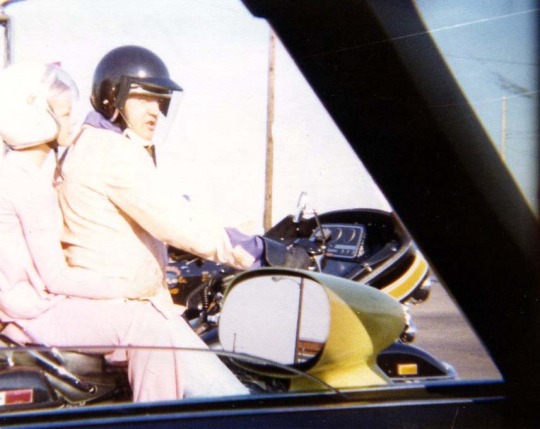
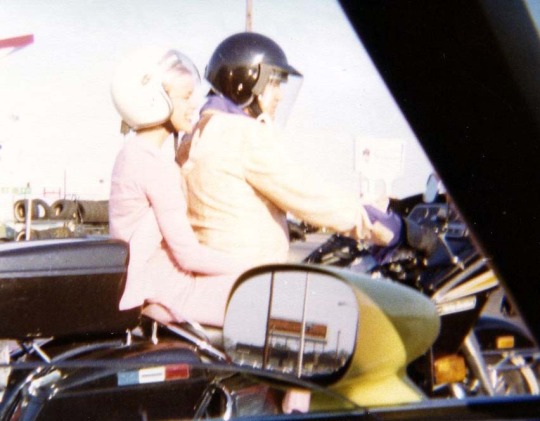
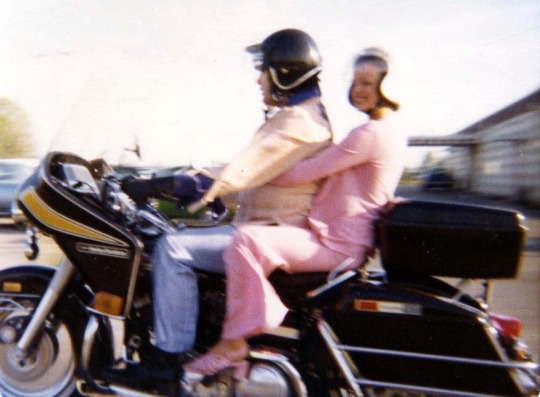
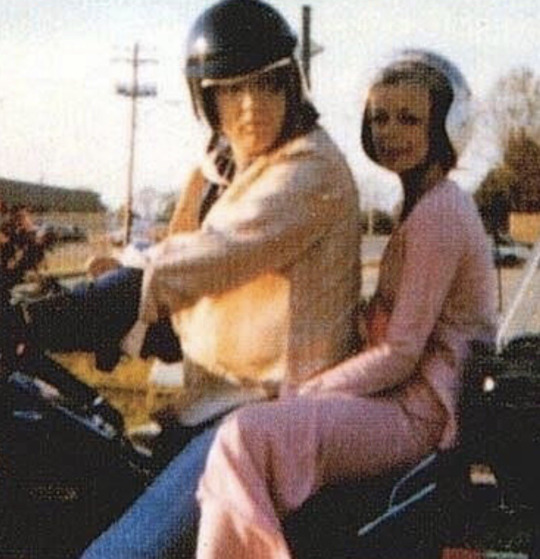
George Klein introduced Tori to Elvis after she participated on his "Talent Party" show. Elvis most likely saw her appearance on the show and asked George to set him up, as he did with Cybill Shepherd and Gail Stanton, who both appeared on "Talent Party" and were immediately asked to be seen by Elvis. This is why many of the MM refer to George Klein as Elvis' pimp 💀, as he was the one responsible for setting Elvis up with women
And like many of the women in Elvis’ life, Tori was involved in beauty queen pageants and held the title of “Miss Ole Miss”. I believe she also occasionally modeled for clothing catalogues while being a student
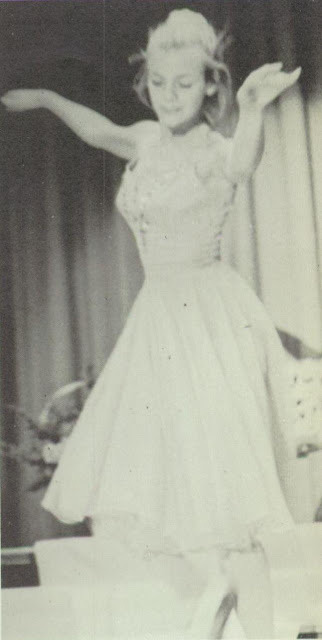
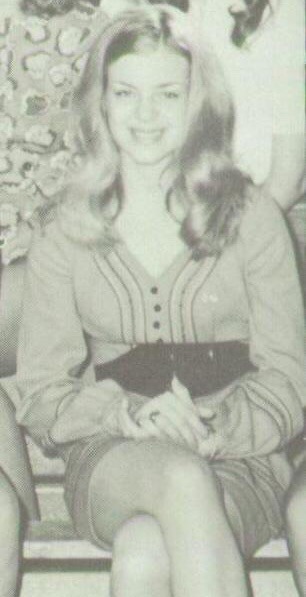
According to George Klein, Elvis began dating Tori while Linda Thompson was staying at the apartment he had leased for her in Los Angeles, California. This goes back to the ask I answered a few days ago regarding Linda and how Elvis would create physical distance between them so he could date other women. Naturally, Linda was upset when she learned about him and Tori 🤧 ⬇️
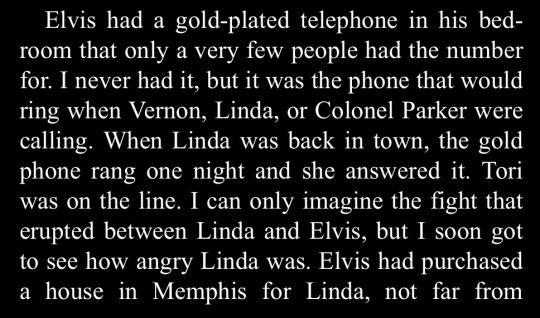
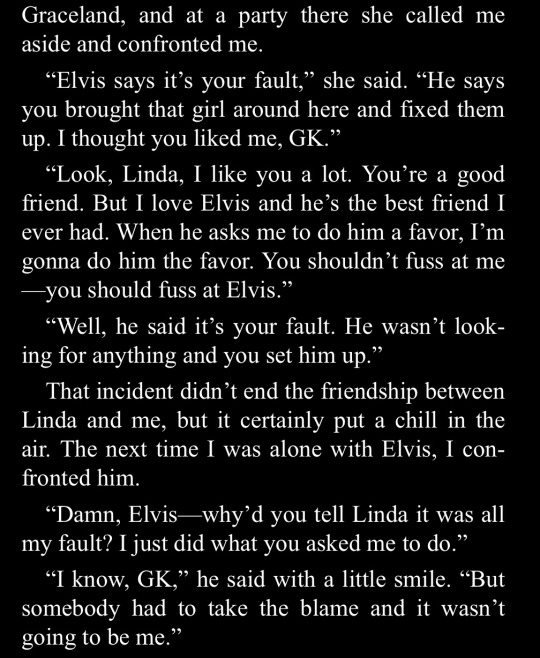
(excerpt from “Elvis: My Best Man” by George Klein)
And, while Tori has never been formally interviewed for a book like "Baby Let's Play House" by Alanna Nash or "Careless Love" by Peter Guralnick, she has openly spoken about Elvis to a few newspapers and may have appeared on a talkshow in the early 1990s ⬇️
Newspaper from August 11, 1994: “Elvis would fly me back and forth from Memphis to Oxford in a little private jet I was certainly impressed," said Petty, now of Dallas. "I wish I could tell you that he was a sweet, down to earth, ordinary man. He was sweet and he was down to earth, but he was extraordinary." One April afternoon, they went for a ride on Elvis' Harley. They were being followed by a woman in a car, who was working on a pictorial book about the star. "At a red light, Elvis said, 'Look at her give her a good picture, and she'll leave us’ So they did. And, it was in focus, from inside a car, with a Kodak Instamatic. The picture appeared in Betty Page's Got Ya, Elvis, I Got ya, published in 1977. Some time after the Memphis ride, an acquaintance told Petty he saw a picture of her with Elvis and put her in touch with the woman who took it. Petty got a print. "It's framed and depending on what else is going on in my life, I either put it in the closet or hang it on the wall." - Interview with Tori Petty
(courtesy of “Clarion-Ledger” on newspapers.com)
As for the possible television appearance, according to this newspaper⬇️, Tori Petty and Gail Stanton ( the playboy model Elvis dated) were interviewed on Geraldo Riveras' talkshow which was set to air on January 8th, 1991 for Elvis’ birthday. I've searched every archive site I know and haven't been able to find the episode 😭 !! In fact, I don't even see the episode listed on Geraldo’s archive which has every season and the names of its’ episodes, so I'm wondering if it ever even aired
Newspaper from December 29, 1990: What would you have to do to wind up being interviewed by Geraldo Rivera? For Memphian Gail Stanton it was nothing deviant or even horrible. That distinction was saved for the interview itself, her grilling by the king of the naughty interview is scheduled to air Jan 8 (10 am on WHBQ-TV). Geraldo was kind of conniving said Ms Stanton ,36, who holds the distinction of being the only Frayser woman who has been a Playboy Playmate of the Month. That was in June 1978 when she followed in the footsteps of Mississippian Stella Stevens with a nude Playboy pose from sea to shining sea. That piqued Geraldo but his real interest was in another distinction. That was Ms Seventies fling with hometown boy Elvis Presley. It was Elvis's Jan 8 birthday that inspired producers to delve once again into the things from drugs to gossipy stepbrothers to girlfriends. The show taped last week included Ms Stanton who was a Shelby County computer programmer before she turned centerfold spread and Tori Petty a former Ole Miss cheerleader who also dated Elvis. Ms Stanton said Geraldo seemed to give short shrift to other guests such as Charles Thompson coauthor of The Death of Elvis spent quite a bit of time- (illegible). Geraldo knows how to turn those questions around, Ms Stanton says, “I think he was trying to get us to say something like whether we'd been to bed with Elvis and of course that's our personal information”. As for Elvis, Ms Stanton volunteers memories such as how he was a Southern gentleman, “There aren't too many men today who open doors for you or are polite and he was. He didn't blast away TV sets in her presence or talk incessantly about mama or even act moody or strange”. She says “He played the piano for me and sang. How many people can say they have been serenaded by Elvis Presley?" - Interview with Gail Stanton
(courtesy of “The Commercial Appeal” on newspapers.com)
And lastly, I found this book that briefly mentions her and the jacket that was given to her by Elvis <3 ⬇️
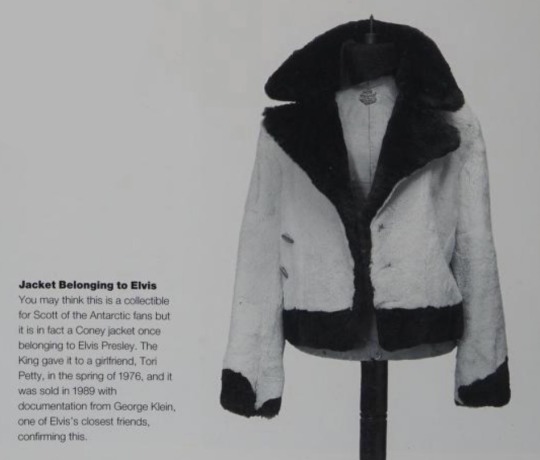
(courtesy of “Rock & Roll Memorabilia” by Hilary Kay)
#if anybody happens to find the Geraldo episode that she is in#I will love you forever !!!#I wish we could have heard more from her 😭#her being dripped out in pink and on the back of Elvis’ motorcycle is so iconic 😩#tori… how did it feel to live my dream ?!#elvis presley#elvisaaronpresley#elvis#tori petty#gail stanton#george klein#linda thompson#big daddy elvis#elvis history#elvis fans#elvis photos#elvis asks#70s#70s elvis
45 notes
·
View notes
Text
"Good and evil are silly lies, nonsense put forth to plague honest sensible men." (Fevre Dream, Martin, 348)

Fevre Dream
Overall: ⭐⭐⭐⭐
Characters: ⭐⭐⭐⭐⭐
Plot: ⭐⭐⭐⭐⭐
Wait, what?! How do characters and plot get 4 stars, but overall it only gets 4 stars? Two reasons, which is what this review is all about, right?
The good: I really enjoyed all the characters, even the "bad guys". All the "good ones" weren't necessarily all out good, but complicated, from human to vampire. Abner Marsh, our main (human) character, describes himself basically as such, but also makes himself out to be hard to get along with. But he's good, he's honest, and in the end, he always sticks by what he thinks is the right decision; even when he's stubborn as hell. I'd say the one... not necessarily drawback... but weird quirk? he describes himself eerily like George himself? I remember setting down the book and going "wait a minute...." and then when my memory couldn't serve enough, promptly Googled 'George RR Martin'. Nothing wrong with it, just found it interesting. Gotta love a little self insert, right?
Joshua York is lovely though, and he's our main "good" vampire. I loved him every time he was on the page. And not in a "oh my gosh he sounds so dreamy" kind of way. Never in this book was I given the impression that these were 'dreamy' vampires... albeit they also had no problem luring their victims. But who doesn't love a good ole conflicted, morally grey soul? Joshua and Abner are vastly different, but that's why they actually work so well with each other throughout their journey. They compliment each other where the other person fails.
Our main bad guys, who I'd say are Damon Julian and Sour-Billy, make you hate them. By my standards, that's some damn good writing when the writers invoke those strong feelings out of you. And these two certainly do it. There's nothing hidden in these two men. There's nothing redeeming about them. I thoroughly enjoy this. I love it when there's truly "the good" vs "the bad"... regardless of the quote by Damon Julian.
George also does a fascinating job with the vampires, from their abilities to their lore. The lore itself is only bits and pieces from what Joshua has picked up over time about himself and other, older vampires. There's definitely A LOT that isn't explored and certainly made me want more, but alas. I don't want to go into detail here really because the lore really does tie into the story a lot and I'm trying to steer away from spoilers, even slight ones.
The... not bad, but the.. meh: It's Martin. It's George RR Martin. If you've read a Martin book, what does he love to do that irritates (most) readers? And for those of you that haven't or somehow haven't heard this before: the man loves to go into detail. Way. Too. Much. Detail. Pages and pages of unnecessary detail. I quite literally do not give a fuck about reading every little detail about a goddamn steamer boat. So... just a head's up about that. We also take so damn long to get to the climax. I think with Martin's writing style, I just get impatient at times, but I do think this could've been just a bit shorter.
The ugly: The n word. Frequently. Quite frankly... Martin was too comfortable using it in my opinion. And I do not care about the time period. I do not care that there are slave states and free states. It's extremely unnecessary. It's a book with vampires. It's a fucking fantasy book. There's absolutely no good reasoning for it. MAYBE, maybe... it makes you hate some of the "bad guys" more, but still. It really didn't need to be thrown around as much as it was.
For the lore/vampires, the characters, and (most) of the writing, I would definitely recommend reading Fevre Dream, with the caveat that I personally won't be reading it ever again. At least not in its entirety. I might go back and review the vampire lore/history because it truly was interesting. But I'm satisfied with my one go-through of the book, and can understand why people rave about it. I do think there's better vampire novels out there, I personally just haven't found them yet.
Read on beautiful people. 📖🤘
#book blog#bookblr#reading#reading journal#book recommendations#book review#george rr martin#fevre dream
2 notes
·
View notes
Note
omg pls pls post one bran meta 💔
i’ll give a rant for also loving my boy while i polish some stuff up but-
I am very much a “bran will be king” truther, i think there’s a lot of evidence for that that people kinda looked past bc they don’t find him interesting, bc they got into this series for the politics and not like, the fantasy aspects lol, but I do have like several ~scenarios~ for him, it’s just that “king of what’s left of westeros” is my favorite bc of the bittersweet aspect of it.
but part of why i think bran’s ending is kind of hard for everyone to grasp, is bc the show just didn’t give a shit about him (like, STATED they didn’t care about the fantasy aspects & i love to shittalk miguel & ryan & sara but at least they are Aware And Excited about the magic aspects of Terros). book readers tend to overlook him in favor of dany (the other big magical character) because george finds writing bran difficult and writing dany easier so we have like 50 dany chapters for every one of bran’s. but whereas there’s several dany chapters dedicated to world building, character introspection, magic, and politics EACH, bran gets all those themes kinda rolled up into these fleeting, monster chapters that are dense as fuck to read. EYE don’t mind that, but giving him like a third the amount of chapters as dany (or jon or tyrion or arya) is just REALLY setting that kid up to fail. but george has really explicitly stated he struggles with characters that are young, and he’s clearly talking about bran (probably sansa, sometimes arya as well) so it’s kinda. i get his struggle!! but he also clearly loves bran as a character bc the chapters we get are real rich!
but d&d don’t even give us what’s on the page bc they do not care!!! so it’s so hard to really pin down what the fuck is going on with bran, bc i truly think they cut most of the notes george gave them about bran, possibly even gave parts of his story to others bc “it would be cooler”, and then used him almost exclusively for exposition & shock value. like, for all we know, the long night is also very short in the books bc of something bran did while in the north, but those two thought it would be cooler if it was just one battle.
[sidebar but like i mean, also jon is a big magical character, but rn jon is less “a magical character” and more “a character that has magic happen to him” bc he’s still a bit uncomfortable about being a warg, bc the logistics & morality of it freak him out. honestly that’s a good thing for jon, bc look at what “do magic first ask questions later” has gotten dany and bran (and theoretically robb). being inside ghost is certainly going to change his outlook on magic & cause another identity crisis, but i don’t think the magical side is where jon is going to struggle morally]
[also i do think the long night is likely to be a little longer, because i think they’re getting to the trident, but potentially they only fuck the north and riverlands and not anywhere else because of something bran does. idk man. for all he goes on about aragorn’s tax policies, he has done with the wights & others exactly what’s done with the orcs. makes me wonder if there’s some plot about the others that involves bran befriending & humanizing a section of them & d&d went “that’s weird and boring” and cut it, like the way the director for i am legend changed the ending to that suicide grenade scene even tho the book ending is so objectively better that will smith said he’s gonna do a second movie but with the cut ending aksjjd. my evidence so far for that is like, negative evidence, which doesn’t make for good meta, so i’m excited to get to adwd so i can reread bran’s chapters in like, ya know, a year 😭]
3 notes
·
View notes
Text
Book Review: The Living Dead (Daniel Kraus, George A. Romero)
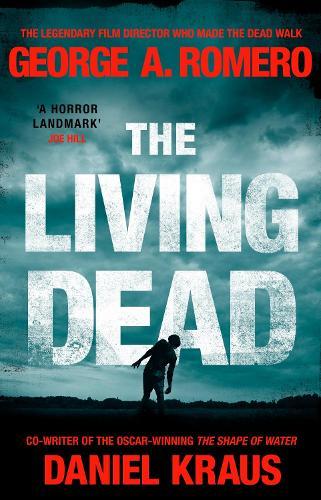
Been wanting to read this for a good long while (Well, 2019 I guess). First, I had to wait for the standard annual wait between hardback and the more desirable/affordable paperback, then I had to wait for that to be a bit more affordable too. And, well...I also had to muster up the determination to actually read the damn thing, because this book is huge, and whilst not the biggest book out there by any means, it’s very easily the largest one I’ve read since I rekindled my love of books during the Covid lockdown in 2020.
And it is big for a reason, this is a true epic of a zombie novel, one that spans over a decade and follows a huge assortment of different characters in a wide array of different locations/circumstances. Across nearly 800 pages (In the paperback at least), this is the late, great George A. Romero’s definitive and final word on the ‘Dead’ series he created back in 1968. One that covers pretty much everything you could hope to cover on the subject, and it does so with his well known understanding that largely it’s less about the zombies and more about the blood-soaked mirror they hold up to the real world and the way humanity behaves within it. But still ripping guts out and all that fun stuff. The best of both worlds, I say!
Now, obviously Romero himself didn’t write the novel, or at least he didn’t manage to finish it. Daniel Kraus was brought in to write it after the legendary director’s passing in 2017, using unfinished writing, notes and plans, and various loosely connected short stories by Romero to bring this final piece of work to life. Now sadly, and despite a chunky authors note at the end which is well worth the read, I remain unclear on how much of this was actually Romero’s work and how much has been improvised by Kraus, but all the same it ended up a mostly quite excellent read.
‘The Living Dead’ is broken up into three acts. More-so it’s broken up into two acts with a short bit of connective tissue between to bridge the large gap of years between start and end.
The first act is set broadly in the first couple weeks of the ‘Dawn’, charting what could well be the first instance of someone coming back from the dead, and then exploring, through a wide array of perspectives and locations, how humanity responds to the end of the world as we know it. Amongst our collection of protagonists are a pair of pathologists, a woman living in a trailer park, a TV journalist and a Naval officer stationed on a aircraft carrier. To name but a few. Needless to say all their differing locations, ages and perspectives lead to a multitude of different tones and scales. With the Naval element providing the kind of bombastic insanity that would’ve likely never made it to the big screen for budgetary/content reasons, whilst the pathologist thread is more intimate and sombre. The main things connecting all these stories, bar some loose shared elements, is both the viscerally described and brutal nature of the violence that ensues, and the way in which both modern American life, and the concept of death and undeath, are explored in both sociopolitical and philosophical contexts. There’s a lot of ‘evil phone bad’ kinda stuff that didn’t quite work for me, but beyond that it’s all quite engaging, and turns the novel into as much of a grim reflection on human nature, in all its highs and lows, in addition to faith and class/race division, as it is a blood and guts zombie epic. Which is exactly what Romero’s ‘Dead’ films were like at their absolute finest.
The second act, which I won’t spoil the grander details of, takes place over a decade after the dead rose, and sees several of the previously established characters ending up in the same location. In my opinion, this act is where the novel gets the most wild and interesting with its zombie elements. Again, it’s best left discovering yourself, but there’s certainly a lot more to all of this than just zombies munching on legs and limbs, and this more nuanced and elaborate take on the undead, again, feeds into the politically charged and ultimately pessimistic vibes of the overall story.
And it is a mostly quite grim read. If you aren’t into gore, even when written down on paper, this isn’t the book for you. If you’re looking for something that will raise your spirits or offer happy endings...you clearly haven’t watched Romero’s previous works in the genre, that much is certain. This is a bleak and brutal epic that questions humanities role on the Earth, and whether or not they can ever ultimately turn around the sinking ship that is modern civilisation into something better for both us, and the planet. There’s a lot of heavy, existential themes to contend with, so if you’re just looking for a bit of spooky fun, this ain’t gonna do it for you. Especially given its titanic length.
Personally, I found it all quite fascinating and gripping to read through. I was really worried before starting that this was going to be a slog...it’s a huge book, and if a huge book isn’t hooking you in, then you’re going to be stuck on it for a long time. Fortunately I enjoyed it a lot, and whilst some elements maybe overextend into goofy or extremely contrived territory, as a lot of Romero’s works ultimately did, even those were at the very least still striking and entertaining.
This is certainly a much better final word on the zombie phenomena Romero himself created back in the 60s, as opposed to the, frankly, abysmal ‘Survival of the Dead’ from 2010, which sadly constituted his final cinematic work. With Romero’s ideas and Daniel Kraus’ strong and poetic writing, this is a must-read for any fan of the genre, and indeed any fan of the ‘Dead’ series of films. Some of it may come across as a little familiar (Shades of ‘World War Z’ for instance), as a lot of zombie material does these days, but ultimately the scope and final destination of the epic journey make this one of the definitive works of zombie media. Flawed in parts, but still highly recommended.
Read it or Leave it : Read It.
Reading Next (The Lamplighters by Emma Stonex)
#Books#Novels#Review#George A. Romero#Romero#Dawn of the Dead#Dead of the Dead#Daniel Kraus#Horror#Zombies#The Stickman#Reading
5 notes
·
View notes
Text
15 Colossus 1335 AE
What is it about the coming of Colossus that draws my fingers to a quill? Paging through this neglected journal proves it so, year after year. Perhaps it is my restless mind, held ashore while my ships are once more careened and tended to.
Or perhaps it is the reminder of the inevitability of change. The seasons come and go, as the tides, as the phases of the moon, as the wheeling of the stars, and here I stand in the midst of all. For so long I have felt as though I am the lonesome, singular thing which does not change, clinging desperately to the routines that have kept me safe and alive.
It is strange how habit can become a prison.
Before the events of the past year, I held that predictability dear. The regular routes of my ships and the confidence of my clients lent themselves to a kind of success I could never have fathomed, sleeping cold in a stable at seventeen.
But the world has widened, and so have my eyes. Away from the world I knew, or thought I knew, I found myself closer to that young girl than the woman of some years I am now. It has been liberating. Exhilarating. I have talked for so long of the freedom of sailing that I forgot what that freedom means. It became rote speech, something of a script.
To truly learn what it means to chase the horizon has been a gift for which I shall ever be grateful. And not just the horizon, as long as I’m being honest.
After the Battle, the Destruction, I lost everything. Everything. I didn’t know where to turn, and I suppose I turned to what was safest.
I’ve never been happy in safe places. I should have known better.
But I can’t say that eking out vengeance has brought me happiness either. Certainly not comfort, while I healed from what should have been a painful, drawn out death. It is only fortune that saw Aliya’s shot go wide. And yet she hit me in the gut. A wound could not have been more symbolic, right through the hollow place that the Destruction and the loss in its wake left behind.
When I took up with Empyrean, when I learned the history of those who were crew, I thought then that my vengeance was personal. But now… This vendetta is so inextricably interlaced with people about whom I have come to care, and it is strange to me how some have made their way into that place I thought was hollow.
The old rage has grown, shifted, taken on a new shape, one both familiar and alien after all these years, all but alone save for George, but he’s been a child until so very recently.
The world shifts, expands, and so, apparently, do I. People are coming to know me, and I am allowing it, which is perhaps the most surprising thing of all. The world widens, and yet somehow it still remains so small.
It seems that as long as my body cannot exhaust itself, my mind has taken up the task. It swirls constantly with old fears, cautious hopes, the constant seethe of rage and how I can satisfy it, griefs that I thought I could at least set aside but which insist on finding purchase on the most seeming unrelated things.
The seasons, the tides, the moon, the turning of the world… If all must change, what exception am I? All I can think to do now is draw those close who are of like mind, and carry on.
2 notes
·
View notes
Text
I mean, Joffrey, as monstrous as he is — and certainly he’s just as monstrous in the books as he is in the TV show, and Jack has brought some incredible acting chops to the role that somehow makes him even more loathsome than he is on the page — but Joffrey in the books is still a 13-year-old kid. And there’s kind of a moment there where he knows that he’s dying and he can’t get a breath and he’s kind of looking at Tyrion and at his mother and at the other people in the hall with just terror and appeal in his eyes—you know, “Help me mommy, I’m dying.” And in that moment, I think even Tyrion sees a 13-year-old boy dying before him. So I didn’t want it to be entirely, “Hey-ho, the witch is dead.” I wanted the impact of the death to still strike home on to perhaps more complex feelings on the part of the audience, not necessarily just cheering.
x
I think Joffrey is a classic 13-year-old bully. Do you know many 13-year-old kids you’d like to give absolute power to? There’s a cruelty in children, especially children of a certain age, that you see in junior high and middle school. We don’t want 13-year-old bullies to be put to death. We probably do when we’re their 13-year-old victims, but they grow up and most of them grow out of it, and sometimes people do regret their actions. But Joffrey will never get that chance, so we don’t know what he would have become. Probably nothing good, but still… - George R. R. Martin
Great insight into the man's mind.
Thanks for sharing with me, @softvniverse.
126 notes
·
View notes
Photo

There is something deeply sad - or at least wistful - about Auld Lang Syne; Burns's version presupposes the separation of old lovers or bosom friends and an unbridgeable distance between them - except for memory and that cup of kindness.
- Simon Schama
The song always struck me as Scottish melancholy as high art.
The song originated as a poem, but it probably wasn’t written by Robert Burns as is commonly believed - at least not entirely.
Scholars have dated versions as far back as the 16th century, to a song called Auld Kyndnes Foryett. Burns himself would have known several versions that were popular in print and performance throughout the 18th century. His song is much closer to these versions than the 16th-century original. One of these, by the poet Allan Ramsay, is set against a backdrop of war and talks of the parting of lovers. Burns typically opens this out and makes it more universal.
When he sent his version of Auld Lang Syne to his great friend Frances Dunlop in 1788, he told her he’d heard an old man singing it. There’s no evidence of who this man might have been – and Burns may even have fabricated the story to show how close he was to popular culture.

The most charitable thing one can say is that the great poet was simply the first person to write down an old Scottish folk song (it bears more than a passing resemblance to “Old Long Syne,” a ballad that was printed by James Watson in 1711).
Burns devoted the last ten years of his short life to collecting old verses, revising and "mending" as he saw fit, even composing poetry to accompany popular airs. Burns himself said, “I took it down from an old man,” and whether it was transcribed or co-authored, it’s safe to say that the “Auld Lang Syne” we know today is some combination of an old poem and Burns’s creative input.
In any case, Burns sent a copy of the poem to Dunlop in 1788 and wrote: "There is more of the fire of native genius in it than in half a dozen of modern English Bacchanalians!" Later he contributed it to the Scots Musical Museum.
Five years later, Burns wrote to James Johnson, who was assembling a book of old Scottish songs: "The following song, an old song, of the olden times, and which has never been in print, nor even in manuscript until I took it down from an old man." It was clear Burns was sticking to his story.

What is less well known is that the melody was not the one he intended. The one that became famous was first attached to the song in the late 1790s and Burns, who died in 1796, knew nothing about it.
The man who published the soon-to-be-famous song was an Edinburgh song editor, George Thomson. Burns had told him a few years earlier that a melody was usually his starting point for writing a song. Yet his inspiration in 1788 when he wrote Auld Lang Syne, which translates roughly as Old Time’s Sake, was actually not a melody but an existing song with the same opening line – “Should auld acquaintance be forgot”.
When Auld Lang Syne was first published in the Scots Musical Museum collection in 1796, it was joined to a rather slow and haunting tune. This melody really brings out an element of sadness in the text.
Burns told George Thomson in 1793 that he didn’t think much of the tune commonly sung to existing versions of the song. In a 23 page letter to Thomson Burns told him that he considered it "mediocre," and Thomson apparently agreed: when he finally published Auld Lang Syne in his Select Collection of Original Scotish Airs in 1799, he substituted a different tune - the one we sing today.
Thomson needed no more encouragement to switch to the melody that we know today. Much more celebratory in feel, it had appeared in some earlier 18th-century fiddle collections and was often referred to as The Miller’s Wedding or The Miller’s Daughter.

By the time Thomson had made the decision to marry the tune to Burns' text, the poet had died in 1796 and there was no chance of asking his opinion on the matter. But certainly Burns would have known it, since he wrote another song called O Can Ye Labour Lea (1792) for a variant of the same tune.
Thomson characteristically forged ahead and sent the tune to Vienna, where the Bohemian composer Leopold Koželuch set it for voice, piano, violin and cello. Auld Lang Syne then appeared in Thomson’s Select Collection of Original Scottish Airs in 1799, set to the famous tune for the first time. From then on, it gathered popular momentum across the British isles and beyond through social gatherings and in many theatrical productions.
Why the song became world famous is still something of a mystery, though all that socialising and theatre-going in the 19th century must have helped. Burns had died in considerable debt and it really is too bad that performing rights were a thing of the future but the song help secure his own cultural immortality.
#schama#simon schama#quote#auld lang syne#song#scottish#burns#robert burns#poem#aesthetics#beauty#culture#music#arts#history#scotland
93 notes
·
View notes
Text
On John Lennon, Hunter Davies, and the Blinding Effect of the Ballad Narrative
Setting aside any specifics on the nature of John and Yoko’s relationship, how it came about and why they decided to get together, I’m struck by how easily people read it as a story about a hopelessly miserable genius in desperate need to be saved by the one woman extraordinary enough to meet him at his wavelength.
It seems to me that, because John was eccentric in some ways, that a lot of people find it incredibly easy to dehumanize a lot of his behaviour, and I especially noticed this while going through the Hunter Davies biography.
As Hunter Davies is one of the few outsiders to have spent a lot of time with the Beatles and their inner circle, he was able to make some vital observations, concerning John's mental space in 1967.
Here are some passages from the book:
John’s record for not speaking, just doing nothing and not communicating to anyone, is three days. He was doing it long before meditation came along. ‘I’m an expert at it. I can get up and start doing nothing straight away. I just sit on the step and look into space and think until it’s time to go to bed.’
He doesn’t consider this frittering his time away. He frittered it away even more, immediately after they stopped touring, when he never got out of bed till three in the afternoon. Now at least he tries to get up and see a bit of daylight. He says if he’s doing nothing he might as well be doing it when there’s some sun around. (Chapter 31, p.411)
Paul and George do tend to go and see people now and again, but John rarely makes an attempt, to give out or make contact. Things have to come to him, or else he doesn’t care about them. And the way his life is ordered, it is hard for anything to get through to him, except on the telly, which he has on non-stop. (Chapter 31, p.417)
To me, these read quite obviously as signs of depression or some other severe mental health issue. The book presents these things neutrally (Pete Shotton even assesses him as ‘happy’ on page 412.), which leaves a rather bitter aftertaste nowadays, when most people are better informed about such matters.
There are also several passages, in which one can observe that John gets some relief from spending time with the other Beatles:
‘[Paul, George and Ringo] seem to need you [John] less than you need them,’ [Cynthia] said.
Before he could reply to this one she got in with an example she’d obviously had all ready.
‘George went off to Los Angeles, just with Pattie, didn’t he?’
John smiled. He agreed it did seem to be true. ‘I did try to go my own way after we stopped touring. I had a few good laughs and games of monopoly on my film, but it didn’t work. I was never so glad to see the others. Seeing them made me feel normal again.’ (Chapter 31, p. 422)
John’s doziness at home left him when he came into the studio. Working with Paul seemed to make him more alive. (Introduction; p.63)
This makes sense to me. Even if his dynamic with his band members – due to the isolation of fame, communication issues and other mental pre-dispositions – was certainly not the healthiest, it makes intuitive sense that spending time with trusted loved ones and doing gratifying activities (like creating music) would at least temporarily be helpful to relieve some of his anguish.
What’s concerning to me, however, is how Davies assesses John’s situation in the 2009 introduction of the book as well the 1985 postscript:
Then along came Yoko. At last he had found a kindred spirit, if of a very unusual kind. John was immediately sparked into life. He was away on a new plane, realizing at once that Paul, who until then had been his buddy, his soul mate, was in many ways as conventional as Cynthia. (Postscript 1985, p.482)
John was the hardest to talk to. I spent hours at his home in Weybridge in silence, swimming round his pool with him, eating a meal, sitting in his little living room, often without a sound, except for the rotten television set flickering away in the corner. […] He seemed to be in a permanent state of mental abstraction. I don’t think it was the effect of drugs, though he was smoking a lot, or even Maharishi’s meditation. For long spells, he just chose to cut off. Looking back, he was waiting for Yoko to come along, and spark him into life again. (Introduction, p. 58)
Notice the use of the word ��conventional”, which actually puts a distance between John as a human and other people.
His problem isn’t anything like depression or the lack of a strong social network or a lifelong struggle with addiction, it’s that the people around him are boring and normal, nothing that you’d understand, dear Reader.
I’m left wondering – did Hunter Davies miss John and Yoko’s descent into a crippling heroin habit? His primal therapy-induced, rage-filled breakdown? How are these things signs of someone who was waiting for The Woman Of His Dreams To Save Him being saved?
All this to say, it’s shocking how strong the Ballad narrative is when it sways even a man who spent hours upon hours in proximity to John, and had made many observations, which don’t support the conclusion he came to years later.
77 notes
·
View notes
Note
Hiya, Mah! Please, if you feel like it, could you write something with: "9. “I’m too sober for this.” “You don’t even drink.” “Maybe I should start.”? For whichever ship you want to :)
Hi! 💓
For you I wrote a missing moment with my all-time favourite Sixth Year Pining Harry. Hope you enjoy this moment and thank you so much for joining this silly game :)
__________
Harry registers the heavy scent of flowers even before he notices it’s Ginny who sat next to him on the couch. He flinches, not wanting her to be so near him, though it’s all for the wrong reasons.
It’s really hard to pretend he isn’t crazy about her when she is so close, wonderful perfume in the air, so near that he wonders how it would be to turn towards her and see her eyes sparkling with a surprise for a second as he would lean even closer, and then Harry would close his eyes and…
She has a boyfriend, stop it. She is not interested.
That thought never makes his dreams go away, though.
‘Ugh,’ Ginny complains, pressing her temples and Harry almost offers to replace her hands. He could massage her, that would be a friendly thing, right? Not really, he admits. ‘I’m too sober for this.’
She frees one hand to indicate everything around her. Fred and George are sitting together at another couch, face troubled after being reprimanded by their father; Mrs Weasley is crying in the kitchen, her husband holding her; Bill and Fleur are close by the Christmas tree, and Harry thinks Fleur is being very accomplished in easing Bill’s worries, so he turns his eyes away quickly.
Harry isn’t sure what’s upsetting Ginny more, but he knows he is the reason Christmas spirit is so low.
‘You don’t even drink,’ he notices grimly.
‘Maybe I should start.’ She opens one eye. ‘Do you think Mum would notice if I went to the liquor cabinet?’
‘Do you have one?’
‘No, probably not. Or else Fred and George would have discovered it already.’
‘They are of age. I’m sure they can provide you with some firewhiskey.’
‘Harry, Harry.’ Now she opens both eyes, looking more relaxed as she watches him with something close to amusement. ‘Shouldn’t you be talking me out of my underage drinking?’
He can’t help his smile. ‘I know that the easiest way to convince you to do anything is to forbid you.’
Ginny laughs. It’s not her brightest laugh, not with the mood still sober in the house—the Minister’s visit weighted them all—, but it’s nice all the same and it warms Harry more than the eggnog he drank.
‘You know me too well, Harry.’
He looks away carefully now. He noticed her, all right, but he doesn’t want her to see how much. It’s certainly more than reasonable for friends.
‘Better than most,’ she adds, somewhat heavier now, and Harry watches her again. Ginny is looking at the lights of the Christmas tree thoughtfully, seeming to even ignore her brother snogging her fiance next to it.
‘Got a problem?’
She blinks, snapping out of something. ‘Problem? No, I—’ she shakes her head. ‘Never mind, today was just a mess.’
‘I know. I’m really sorry.’
Ginny frowns. ‘Sorry for what?’
Harry sighs, glancing guiltily in the direction of the kitchen. ‘Well, Percy and the Minister—’
‘No one forced Percy to be a git, Harry,’ she says, somewhat more like herself suddenly. ‘He came here as the Minister’s lapdog because he wanted to.’
‘If it weren’t for me, he would still—’
‘Still be blissfully ignorant that You-Know-Who returned?’ she asks forcefully. ‘Find another stupid reason to betray his family?’
‘Yes,’ he agrees, sad. ‘But it wouldn’t be me.’
She shakes her head. ‘Stop it. Really. It’s his choices, and you’re not responsible for them.’
Harry doesn’t answer, stealing another glance to the kitchen. He can hear a sniffle coming from there.
‘No one blames you, Harry, especially not Mum.’
He looks back at her, almost smiling. ‘Sometimes it's like you are reading my mind.'
And then he wonders if it wouldn't just be easy if that was the case; if Ginny could just see how he feels about her, how she is so bright and how much... How much she visits his dreams.
Maybe it's good she can't read him that well.
'I know you too,' she answers calmly. 'If you are not blaming yourself for something, you call it a bad day.'
'I can not blame myself… some days.'
She raises her fist, holding an imaginary cup.
'To only blaming yourself for things that are under your control,' Ginny declares, and Harry toasts playfully with her.
Ginny blinks, taking a deep breath, then she picks up a book that was standing on the coffee table in front of them, flipping through it. Harry notices all pages are blank.
'It's a sketchbook,' she says, knowing he is looking. 'Dean gave me for Christmas.'
'Oh.' A weight drops in his stomach, unpleasant. 'Nice.'
'Yeah, I told him I wished I could draw like him and he thought I could begin…'
She looks a little troubled at the book and Harry suddenly knows what's on her mind.
'It's just a sketchbook. Nothing else.'
'I… I know.' Ginny sighs. 'Blame ourselves only for what we can control, right?'
'Right.' He smiles. As jealous as he feels about Dean giving her a Christmas gift, he decides that making her feel better is more important. 'What are you going to draw?'
Ginny grins as if unable to resist his joyfulness. 'Oh, I don't know. Nothing probably. When I said I wished I could draw like him it was more wishful thinking, not that I really wanted to do it. I am no artist.'
Harry indicates the room, so bright with the paper decoration she had spent hours doing. 'I don't know, decoration is stylish here.'
'Thanks,' she laughs, not really taking him seriously. 'Well, I can't draw still. I have no patience for it.'
'Then let's not draw.' He looks around until he finds a quill and ink. 'Doodle. Write a short story.'
'I could write a poem,' she says, just a really teasing, a blush coming to her cheeks.
Heat creeps upon his neck too.
'You are good with rhymes,' he whispers.
There is a moment of silence, and Harry feels Ginny's eyes over him as if she is trying to assess if he is messing with her or, somehow, really complimenting her for her valentine's card from years ago.
Again, he almost wishes she could read her mind.
Then she lets out a sigh, placing the quill over the first page of the sketchbook and drawing a grid. She draws a cross at the middle of it, watching the ink dry before offering him the quill.
'Your turn.'
Their hands brush when he goes to pick the quill and for a moment, three very short and very long seconds, their eyes meet. Maybe she can read his mind after all, because her eyes are sparkling, a blazing look on them, and she has to know how he feels about her because he is sure he is matching her gaze. The same longing, the same emotions, the same urge to just lean in and…
They blink at the same time. Harry draws the nought anywhere, not really paying attention, but Ginny ends up allowing a draw.
At the end of the game, she looks at their art, that silly game of noughts and crosses that is the only thing in the sketchbook, a satisfied smile on her lips as if that's the kind of thing she wants to fill those pages with.
Harry wonders if she wants to fill pages with him too.
'Another match?'
Harry can't refuse her.
__________
Please join me in this birthday special (asking for a prompt! Let me see your work too! 😍)
#hinny#harry and ginny#missing moment#harry feels really romantic when he is pining#pining harry#i wrote like that because i cant draw either#t: fanfiction#birthday prompts
250 notes
·
View notes
Note
hi love, it's me again! i just can't get enough of your writing... i'm sorry to be asking for another fic, i guess i just can't help myself. lately i've been obsessed with the fake dating thing, so i was wondering if you could write a fred x reader (basically same reader as my last request, gryffindor, same year as ron) with that? like, maybe george knows they fancy each other and makes a bet with him so they start fake datig but realise they're in love with each other? aaa thank you so much, ly
bets off // fred weasley
masterlist!
a/n: i used the same pronouns from the last request, hope you don’t mind!! i apreciate u sm ur always so active w my fics ily <3333 this is the first thing i’ve written in a while that i’m actually proud of so i hope u guys like it :D
summary: Fred makes a bet with George that entails fake dating you for at least a month. He never expected to fall in love with you.
(5k)
-----------
Competition was healthy. At least, that’s what Fred told himself as he looked at George’s outstretched hand, a cocky smile etching the boy’s lips.
“Two weeks?” Fred asked, looking suspiciously at George.
“Two. Weeks.” George answered definitively, smirking at his brother.
Fred considered this in his head. Two weeks to get you, someone who had never previously shown any romantic interest in him, to date him for at least a month. He doubted it would be hard, for he had never had any trouble getting girls to swoon for him in the past. A few winks and charming sentiments and you would be putty in his hand. With this air of confidence, he shook George’s hand.
“You idiot!” Lee, who had previously been silently watching the exchange, called from across the table, a baffled smile on his face.
George laughed, leaning back in his chair and looking at Fred like he agreed with Lee.
“What?” Fred asked, the overly confident look still littering his features.
“You can’t win with this one,” Lee explained, shaking his head, “you either piss off Ron when this goes right, you piss of Ron when this goes wrong, you come out the git for breaking a girls heart, or you come out the embarrassed git who was rejected by your kid brother’s best friend.”
“Hey,” Fred said, faking offence, “I never agreed to ask out Harry.”
George and Lee rolled their eyes, hiding smiles as they continued their homework.
Fred was not deterred by Lee’s warnings, for he had a plan to avoid all of that. He was simply going to tell you the truth.
He found you on your way to the green house, pulling you away from a Slytherin girl you were walking with.
“He just stared at her? Like he didn’t eve-” you felt an unexpected tugging, “Ah!”
You squealed, feeling your feet stumble under you for a moment as you gathered your wits again. You looked down at the hand pulling you, following it up to the face. It was Fred, which was odd, because you two were not known for pulling at each other in hallways.
“You’re going to miss Herbology!” your friend called out to you, a worried expression on her face.
“I’ll meet you there, save me a seat!” you called back to her, turning away and following Fred as he still dragged you.
“Fred? What are you doing?” you asked him, making no effort to move from his strong grip.
“Got to talk to you,” he said airily, barely looking back at you as he pulled you down an empty corridor.
He let go of your arm, smiling down at you as you waited for him to speak. He didn’t take the hint, just looking at you.
“What did you want?” you glanced at your watch, seeing you only had a few minutes before Professor Sprout would start class.
“I have a proposition for you,” Fred drawled, a mischievous glint in his eyes as per usual, “what do ya say?”
You squinted your eyes at him, frowning, “I have to hear the proposition first.”
“Do you?”
“Yes, thats how propositions work.”
“I hadn’t realized,” he replied sarcastically, dropping his cool demeanor and letting some desperation seep into his voice.
“What do you want?” you repeated, slightly more annoyed.
“I may have made a bet that heavily relies on your willingness to do me a huge favor,” he said, a hopeful smile coming to his face.
“Oh god, Fred, what did you do?”
“George may have implied that I was in a dry spell when it came to girls,” he said, smirking, “and obviously that’s just not true. So, he suggested a bet to see if I still had my skills-”
“Your skills?”
“-yes my skills, would you listen?”
Fred leaned closer to you, his eyebrows raising as you rolled your eyes.
“Back to what I was saying,” he drew in a breath, dragging out this entire conversation, “George suggested a bet to see if I could still charm the ladies,” he wiggled his eyebrows and you quirked one of yours.
“Long story short-”
You interrupted again, “That was the short version of that story? Fred can’t we do this later, I’ve got class in,” you glanced at your watch. “two minutes.”
“No! Give me a second,” he ran a hand through his hair, putting his strong hands on your shoulders to keep you in place, “I made a bet with George that I could get you to fall in love with me in two weeks and date you for a month!”
You looked up at the boy, thinking he had gone off the end. He had to, either that or he was messing with you. Or maybe he had been slipped a potion of some sort.
“Fred,” you started, your kind tone giving Fred the impression you would agree to the plan, “you just waisted the very limited break I have between classes, successfully pulling me away from a very entertaining story about Snape, and probably making me late for Herbology.”
Fred groaned, throwing his head back in annoyance.
“I’m serious!”
You pulled against Fred’s grip, but he kept you in place. His face lit up, obviously coming up with what he thought would be a great plan. He released you briefly, digging his hands in his bag and moving crumpled papers around. He pulled out a neatly folded piece of paper, brandishing it like it was a diamond.
“This, my love, is going to get you out of Herbology this class period,” he said, unfolding the paper.
He revealed a blank piece of paper with tiny sparkles floating on the page. As he held it for a second longer, words began to form on the paper, writing something.
‘Professor Sprout,
Please excuse Y/n from Herbology this period, she came to me with a pain in her stomach and I gave her a potion to fix it. She stayed in the infirmary during the period.
-Poppy’
You had heard about these before, enchanted notes that were written in authentic handwriting and enchanted the reader to believe it, no matter what they said. Perfect for forging notes from teachers.
You stared at the paper in awe, grabbing it from Fred’s loose grasp.
“Yeah, you’re welcome. That’s the last one I have,” he said, feeling a bit remorseful having to give it up. He had been planning to use it to get out of Ancient Runes tomorrow.
You folded the paper again, putting it neatly in your bag and looking back at Fred.
“Alright, let’s go,” you sighed, allowing him to lead you to the great hall, through the courtyard, and out to the Quidditch Pitch where no teachers would be.
You sat in the stands, overlooking the empty and wet field,
“You want me to date you for two weeks?” you asked, sounding reluctant.
“No,” Fred said, sounding annoyed, “I want to fake date you for a month, but we won’t start until two weeks from now.”
You squinted, looking out at the stands on the other side of the field. You were thinking about this, finding the cons to outweigh the pros.
“What’s in it for me?” you paused, hearing Fred’s groan from beside you, “I mean, this could ruin my friendship with Ron, I get the embarrassing reputation when you fake dump me in a month, I don’t see how this is benefiting me.”
“Ron won’t care, I promise you,” Fred said acting as if this was obvious, “he lets Harry ogle Ginny all the time. And as for our fake dumping, that can be totally on your terms. I just need to win the bet with George.”
“What do you get if you win?”
Fred had hoped you weren’t going to ask that, but he was realizing you were smarter than he thought.
“Three Galleons,” he lied, looking at your skeptical face in the corner of his eye, “fine, six Galleons.”
You looked expectantly at him, waiting for his offer.
“I’ll split it with you,” he finally gave in.
He was a little upset at having to share his future winnings, but once you agreed to the bet and squealed excitedly at the possibility of some Galleons, a smile spread on his face.
Fred began laying the groundwork the next day. He made sure to send you flirtatious smiles when George was looking, waving to you in the halls, and talking to you in the common room.
You, Hermione, and Ron sat at a table in the corner, the three of you poured over a chess match. Ron was successfully beating Hermione, watching her as she tried to remember the rules he had taught her over and over.
“You can’t do that,” he said impatiently as Hermione tried to move a pawn backwards. His hand reached out and returned the piece back to where it was, and Hermione groaned.
You leaned back in your chair, closing your eyes and turning your head up towards the ceiling.
“Hello,” Fred purred from above you, looking down at you.
You snapped your eyes open, not entirely used to Fred’s flirting yet. It took you by surprise most days, and he always managed to get you when you weren’t expecting it. You looked to Ron, gauging his reaction. His eyes stayed locked on Hermione’s frustrated face, arms crossed as he waited for her move.
“Hello,” you replied, turning your head to face Fred as he move to your side.
He leaned against your chair, his hand supporting his weight as he wrapped it around the back of your chair. The top of his hip bumped into your shoulder, and you resisted the urge to lean away from him. It’s not that Fred Weasley was disgusting or anything, he certainly wasn’t, but he had a reputation. Fred wasn’t known to be faithful or respectful of the usual rules regarding relationships. He wasn’t tied down, and half the student body has seen him naked (or wanted to). You had gone through your phase of liking Fred, and that phase lasted longer than you’d like to admit. You refused to boost his ego, though, and felt determined to not let this fake dating get to your head.
Ron was still busy with his chess match, now watching Hermione’s focused gaze turn into a nervous one as she became aware of Ron’s eyes on her. She bit her lip, tapping her fingers on the table.
Fred glanced down at you, quirking an eyebrow and nodding his head towards Ron. He was showing you that Ron wouldn’t care if you two dated, testing Ron’s limits.
Fred’s hand moved slowly from the back of your chair to your shoulder. His slender fingers pressed gently on your clothed arm, moving to brush a piece of hair from your neck. He twirled a piece of your hair in his fingers, raising an amused eyebrow at Ron’s lack of reaction.
“Merlin, Hermione! I’ve taught you 100 times!”
Hermione scoffed, leaning back in her chair and crossing her arms.
“Ron!” she exclaimed back, offended.
“Look,” he moved his hand to one of her pieces. He whisked it across the board, then one of his pieces, and then one of Hermione’s, and then one of his own, “Check.”
“Maybe if you had patience and didn’t stare me down every time it was my turn-” Hermione started, glancing to you for support.
Her eyes widened when she saw the somewhat intimate position you were in with Fred, her sentence dropping.
“If you didn’t take so long, I wouldn’t stare you down!” Ron huffed and pushed his chair back, standing suddenly.
He hadn’t even glanced at you and Fred, missing Hermione’s shocked expression.
“What are you doing?” she questioned Fred, sounding even more offended than when Ron was yelling at her a moment ago.
“What?” Fred replied nonchalantly, pushing his body away from yours and taking Ron’s seat.
He moved the chair closer to the table, purposefully brushing his knee against yours. You knew he was watching your face, so you kept a neutral expression.
“He was all over you,” Hermione whispered to you, as if Fred wasn’t right in front of her,
“So?” you asked, acting as if it wasn’t abnormal for Fred to ‘be all over you’.
You were internally cringing at the whole thing, at Fred’s forwardness, lying to Hermione, the whole situation.
“Something must be in the air today,” Hermione said to no one in particular as she stood from the table, “everyone’s lost their minds.”
She left you and Fred, leaving him with a smirk on his face.
“I think that went well,” Fred said, moving the pieces on the chess board around swiftly as he set it up for a new game.
You moved to Hermione’s seat so you were across from him, rolling your eyes.
“This is ridiculous, Fred,” you said, and at the sound of your genuine annoyance his eyes were on your face.
The board in front of you was set anew, white closest to you. You let yourself sit in your frustration for a moment, looking down at the board and moving a pawn. Fred made no move to his own pieces, just staring at you from his side of the table.
“What d’you mean?” he said, watching your hand retreat from the board.
“These public displays of affection- isn’t it a little ridiculous?” you said, locking your eyes on the game in front of you.
A look of hurt flashed across Fred’s face, not that you would have seen it, and he cleared his throat awkwardly. His hand lazily moved one of his pawns.
“I don’t think so, no,” he said, leaning back in his chair and still studying your face, “I think they’re quite effective.”
“They’re only effective because I’m playing along,” you moved another pawn, hoping Fred would take the bait so you could steal his pawn.
“Which I appreciate fully,” he said, leaning forward and moving his pawn exactly where you wanted him to.
You stole his piece, advancing on the board. He hadn’t even registered the game, frankly, only looking at you.
“I feel like-” you didn’t know what you felt. You hadn’t put it into words, but you knew you didn’t like it.
Fred, and older, charming, handsome boy, was showing you a new amount of attention. Fred, a boy you had a crush on almost the entire time you’ve known him, was sending you flirtatious winks in the hallways and being very affectionate. Fred, your best friend’s older brother, was trying to date you to win a bet.
“-nevermind,” you finished, realizing you could not say any of this aloud.
Fred had a quizzical look on his face, watching you as you silently sat across from him. You met his eyes for the first time since he sat down, swallowing hard. You stared at each other for at least a minute, neither of you moving or breaking the contact. His eyes had an intensity in them that you had never seen before, but they were also gentle and kind. He looked soft, his face illuminated by the faint candle light and fireplace, casting a yellow hue over his skin. His hair was grown out and pushed off his forehead, falling easily on the sides of his face. He had taken his tie off, though still in his school uniform, sleeves rolled up to his elbows. His mouth, usually in a resting smirk, was thin and straight, making him look rarely serious.
You felt like it took ages, but you finally broke his stare and cast your eyes downward at the board. You looked back up at him, seeing his eyes unmoving from your face.
“Your move,” you said, raising an eyebrow.
Fred’s eyes shot to the board, and he moved the first piece he saw. His mind was racing as he tried to collect his thoughts, all of which were about you.
He had no idea what happened, but his heart was beating incredibly fast and his hands were sweating. Fred, a man who had never once done anything serious, was feeling very serious. He didn’t know what was going on inside his head, but all he knew was that he thought you were remarkably beautiful. You were perfect, really, and he could not wait for this game of chess to end so he could get the hell away from you.
Fred had never been in any sort of serious relationship. He had never dated a girl for longer than a few weeks, usually doing something that offended them (that was often mentioning how hot another girl was, or, in the worst case, snogging said other girl). He didn’t care for anything long-term, anything serious, because he couldn’t be bothered to find anyone that interesting. You, however, made his hands sweat. No one had ever made Fred’s hands sweat. No one had ever made Fred’s mind run blank.
He blinked at the board, realizing it was his turn again, and felt like giggling like a school girl. He shot his head up, looking around the common room and pretending to be in a hurry.
“Have you got the time?” he asked, watching as you looked down at your wrist- eyes flickering to your hand, which he realized he wanted nothing more than to hold in that moment- checking the time on your watch and telling him. He sprang from his chair, “I told George I’d meet him in a few, can we continue this later?”
He hadn’t even waited for an answer before he was running through the portrait hole, nearly knocking a few first years off their feet when he bumped into them.
Fred disappeared from the common room, leaving you with the chess board.
For the next few days, Fred’s flirting was non-existent. He wasn’t ignoring you, but the entire dynamic between you had shifted; something changed. He wasn’t painfully arrogant, seeming to take more effort in the way he treated you. There was no inappropriate flirting, no lustful winks. You wondered if the bet was still on.
You found out soon that it was.
You and Hermione left the library fairly late into the afternoon, but neither of you minded the time that got away from you. You spent the day doing very little actual studying, talking and laughing instead. There was a very few amount of people who could tear Hermione away from her studies, and she didn’t often like to admit that you were one of them.
“Are you going to tell me why Fred was so-” she broke off, shuddering in some sort of disgusted way that made you laugh “-touchy with you the other day?”
Hermione had been pressing a little bit every time she saw you about Fred, and you had been avoiding it every time.
“I still don’t know what you’re talking about. That was just Fred being Fred,” you insisted, rolling your eyes playfully.
The guilt of lying to your friends left you a few days ago, instead you only felt overwhelming uneasiness as your schoolgirl crush for Fred resurfaced. You couldn’t help it; the hot older boy you had liked since your first year was suddenly putting himself in compromising situations with you. So, you couldn’t tell Hermione about Fred’ bet, because then you wouldn’t be able to stop yourself telling her about your genuine crush.
“Really?” Hermione teased, bumping her shoulder into yours.
“Yes, really,” you insisted, turning the corner to the main staircase that was crowded with students wandering the castle on the weekend afternoon, “ I don’t get why your fixating on this, ‘Mione.”
Your words, however, fell on deaf ears. Her gaze was locked on something on the stairs beneath you both. You followed it, seeing the heavy stream of students starting to part. From your position, you couldn’t see much through the crowd, but soon the crowd thinned around you and you got closer.
Fred stood on the landing, a huge bouquet of flowers in his hands. You bit your lip, trying to hide the laugh bubbling in your chest. Such a grand gesture for a fake one-month relationship, this boy was determined to beat George and win those three Galleons. You felt Hermione clutching loosely to your arm, a dazed sort of look overcoming her features. You couldn’t help but laugh at this, prying yourself free from her grip and walking down the stairs to meet Fred.
He also looked sort of dazed, and with a quizzical expression you felt your face heat up under the stares of everyone in the stairwell. You came to the landing, looking up at Fred. His hand shook a little as he held the flowers, and he bit his lip harshly.
“Want to go out with me?” he asked, a surprisingly earnest voice replacing his usual smug one.
You glanced at your watch, moving to stand on your toes to reach him. You moved your mouth to his ear, speaking so only he could hear you, “You’re about a week early with this gesture, Freddie.”
He chuckled, and from being so close to him his chest bumped yours slightly. You fell to stand flat on your feet, still close to him. He looked down at you, holding the flowers between your chests.
“I don’t like following schedules,” he said, grinning down at you.
You resisted the urge to wrap your arms around his shoulders and never let go, settling instead on a bashful smile. He handed you the flowers, the brown paper they were wrapped in feeling a little damp from how profusely his hands were nervously sweating.
When he made this bet with George, he had just planned on kissing you in some busy hallway to announce the start of your relationship, as he did with most of his relationships. Somehow, though, you felt more special. His stomach sank every time he thought about the limited and fake month he’d have to with you, but he forced his way through it.
So he went to the field by Hagrid’s hut and picked the best flowers he could find, wrapping them in a brown paper and organizing them so they were perfect, because you were perfect.
He looked down at you, watching you as you held the flowers up to your face and smelled them. Your eyes were light and filled with innocent excitement, giving him an enchanting smile that showed all your teeth; you looked incredibly and undeniably happy, and that made Fred happy.
You had both nearly forgotten about the entire student body surrounding you both, watching the exchange. Fred, feeling unnerved by the vulnerability he had exhibited in such a large crowd, looked up and smiled smugly, wiggling his eyebrows. The entire staircase erupted in a somewhat jumbled mix of cheers and laughter, sending a deep red blush to your cheeks. Fred looked down at you, and in a moment of unfiltered happiness, brought his hands to your cheeks. He lifted your head from where you had ducked it to hide the blush, forcing you to look up at him with the embarrassed grin on your lips. Before he could think about what he was doing, his face was leaning closer to yours and his hands on your cheeks were pulling you closer to him. You barely had the time to register what was happening, only hearing the laughter and cheers around you get louder as Fred’s face was pressed against yours.
He was fast at first, passionate and quick as if he thought he only had a second before you pulled away. You couldn’t though, even though every bone in your body was telling you to. Your lasting feelings for Fred were telling you that this kiss was okay, that your friendship with Ron would take the backseat for a while as you let Fred press himself against you. Your thoughts were fading, being replaced with the hyper awareness of everywhere Fred was touching you. His lips slowed and his breathing became slower too. He let out a sigh through his nose, the air hitting your face and sending a brand new flush to your cheeks. His hands on your cheeks stopped pulling you towards him, now being a gentle and soft presence on your skin. His left hand was grazing your jaw, his calloused fingertips tickling the skin lightly. His right hand cupped your cheek firmly still, but his thumb rubbed against your cheekbone. You held the flowers in one hand, and it wasn’t until a few seconds into the kiss that you had even remembered you had hands. You rested your hand holding the flowers against his chest, tilting the bouquet so it didn’t hit Fred in the face. Your other hand snaked up his arm, clutching loosely at his strong forearm as it hung between your bodies.
You were both at each other’s wills, you would do anything Fred and Fred vowed to himself that he would follow you to the ends of the Earth, if you asked him to.
The spark moving through Fred’s body was nothing he had ever felt before. He didn’t feel it when he kissed Angelina Johnson, his first kiss, after winning a Quidditch match. He didn’t feel it when he drunkenly kissed Alicia Spinnet at a party. He didn’t feel anything close to this when he kissed Katie Bell in a game of truth or dare last year. You were completely new to Fred, and part of him already knew he wanted to spend every second with you from then on out.
You pulled away first, entirely and completely breathless. You looked up at Fred, mouth opening and closing like an out of water fish as you tried to find words to say in this moment. Fred just chuckled, bringing his hand on your cheek to graze his knuckles against your swollen lips. You closed your mouth, feeling okay with having nothing to say, and figuring it was better to not say anything anyways.
The crowd registered in your brain, making you feel extremely embarrassed again. You shoved your face into Fred’s chest, hiding the flush all over your face.
“Alright! Shows over, you perverts,” Fred called out, smiling widely at the group.
You heard the shuffling of feet begin around you, the traffic beginning once again. A few wolf whistles reached your ears, and you didn’t remove yourself from Fred’s chest until you were sure everyone had moved on.
Fred’s large hand rested on the back of your head, soothing down your hair. You found it oddly intimate, and you knew letting all of this happen was only setting yourself up for hurt when this bet was inevitably over, but you couldn’t bring yourself to care.
Pulling away finally, your flowers clutched at your side, you took a deep breath. You were bringing your gaze to look up at Fred, but a group of redheads standing behind him caught your eyes and made them widen.
“I am so telling mum you have a girlfriend!” Ginny squealed, her voice easily heard in the now empty stairwell.
Fred turned to face his family, seeing Ginny, Ron, George, Hermione, and Harry looking at him as if he’s sprouted five new limbs.
Ron elbowed Ginny, sending her a wide-eyed look, “my bestfriend is not his girlfriend!” Ron said confidently, then turning to Fred with a threatening look, “My bestfriend is not your girlfriend.”
Fred smiled nervously, “I’m not dating Harry, Ron,” he attempted to joke, only earning a laugh from George and an embarrassed look from Harry.
You peaked from behind Fred, meeting the group. You smiled at them sheepishly, meeting Hermione’s baffled eyes.
“I knew it!” she called, causing the entire group to turn their heads to look at her, “I knew you fancied her.”
Hermione looked quite proud of herself, but Ron looked fuming. Harry had sort of a ‘I-saw-this-coming’ look on his face.
“Guys,” you said, stepping towards them, “Ron.”
You gave Ron a pleading look, prepared to embarrass yourself and set the whole thing straight, even prepared to lose 3 Galleons. Suddenly, Hermione stepped between you and Ron.
“Ronald,” she said sternly, snapping Ron out from his angry mood briefly, “I hope you are not about to prevent a lovely relationship just because you have no emotional intelligence or maturity regarding these subjects.”
Your eyes widened from behind Hermione, casting a shocked glance to Fred. George and Ginny stifled their laughter, saving an embarrassed Ron some of his pride after being scolded by Hermione.
“But he’s my brother!” he whined, his anger leaving him and instead being replaced by some sort of tame disgust.
You couldn’t take it, every part of you wanted to tell them it was a bet, the galleons be damned. You looked to Fred with a warning look, only to see him digging in his pockets.
“George,” he called out, removing his hand from his pocket and clutching something, “catch.”
Fred tossed six coins at George, and George caught them with surprise.
“Bets off,” Fred said, looking painfully serious.
You felt your breath hitch in your throat, an immense feeling of guilt wash over you. You had cost Fred six galleons, even after the work he had put in. He had kissed you for the sake of it, and you couldn’t go one month.
“Fred,” you stuttered, looking at him with guilt
His mouth broke into a grin, however, and he took a few steps towards you. George watched Fred’s movements, and began pulling away the group. Ron, still standing there with a confused look on his face, was tugged away by the back of his collar.
“I don’t want to fake date you,” he whispered to you once he was close enough, tucking his hands in his pockets.
“Well, that seems like a lot of work for nothing, then-” you started, only for his lips to fall onto yours and silence you.
You couldn’t help it, again, as you let yourself melt into him. He pulled away all too soon however, resting his forehead on yours as he looked into your eyes.
“I want to date you for real,” he said, biting his lip nervously, “not as a bet.”
Your eyes widened, and once again you could not think of anything to say. You opened and closed your mouth, searching for the words, but gave up. You gave a relieved sigh, hearing the words you had dreamed of hearing since you were 12, and kissed Fred Weasley.
#fred#weasley#fred weasley#fred weasley fluff#fred weasley fic#fred weasley fanfiction#fred weasley x reader#fred weasley x y/n#fred weasley x gryffindor!reader#fred weasley x you#fred weasley x gryffindor#fred weasley x gryffindor reader#gryffindor#hogwarts#fred weasley fanfic#harry potter fanfiction#hp fanfiction#fred weasley imagine#fake dating
1K notes
·
View notes
Photo
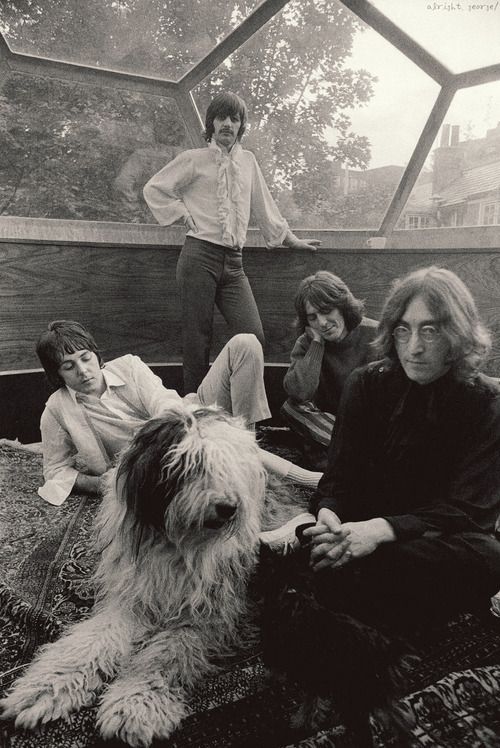
The Beatles and Martha during the Mad Day Out photoshoot (1968)
Q: Give a brief thumbnail sketch of each Beatle as you perceived him.
Ken Mansfield: Paul was the energetic one, the one that seemed like the popular kid in high school. He was the one whom you would cruise main street with your arms hanging over the car door edge, pressing tight to make your muscles look bigger. He would be the guy who would wave at the girls and slow down so they could jump in the back. I never felt a strong personal agenda coming from Paul, and by that I mean that it didn’t feel like you had to figure out who he was or where he was coming from. He was always presenting the next project or place to go. It was the sheer impetus of purpose that put things in motion so what you saw was an idea and a goal, and none of it needed complicated examination. “Here’s what we are about to do and that was exactly what we were about to do.”
To me, Paul was the unabashed leader of the group, the hard-charging one with the ideas and the one that on the surface seemed to be less troubled about things in general. I’ve said it before that he was like a hyper-kinetic kid that never slowed down – the difference being that he was able to harness this energy into his God-given musical talent and just let ‘er rip. In all honesty, he wore me out. It was fun, the times I got to hang with him or work with him, but his tempo was maddening and his energy pool bottomless. I did have an underlying pressure as the US manager of their company so that I couldn’t just totally go with the flow and hang out and party. My responsibilities were always looming in the back of my mind. If we had been high school buddies and there had been no fame, I think Paul would be the kind of person who would be great to hook up with again at class reunions. It would always be good to see him again. He, like the other Beatles, had an admirable sense of loyalty to their old mates. I was with Paul when he brought Ivan Vaughn, an old friend from his Liverpool school days to LA with him to just hang out. Ivan was certainly no one famous or even in the business – just an old friend hanging out with a mate who just happened to be the “cute Beatle.”
George was the one you would have seen in the cafeteria keeping to himself. But he would also be the one to move things aside in order to make room for you when you sat down in the seat next to him. He would welcome the company and share in the moment in an easy manner. He was the kind of guy that a slow, easy friendship would develop with over time and without the fame an everyday George would have probably been the perfect neighbor. He was so gentle and easy to be with. There was thoughtfulness in his responses to things as they were happening whether it was the conversation or the next move. He was the model of a man at peace with what was going on inside and his serenity spilled out into his surroundings. I could talk with him about simple things and was able to forget the Apple stuff because I could tell that the world didn’t begin and end with that for him. He would be more concerned about how I was doing rather than what I was doing. We shared some very personal times together because we were young, happening dudes with new wives who liked each other. I got to be the LA guy with him during his frequent and extended stays. Just because we were in Hollywood didn’t mean we had to be crazy. It was simple and easy being with George – we would go buy jeans together or sit around the house late at night and not say much.
John was the different one. He was the kid who also might be eating his lunch alone but would probably be standing up, leaning against the soda machine looking out across the lunchroom like it was another planet. There was always this sense that he was a bit unapproachable and he would be the one to do the approaching if anything was going to come down on a personal level. I spent less time with him than the others with the main difference being that I never had that alone time away from the band or Yoko – except for the day over at Ringo’s LA home in 1976. That particular event was an accidental encounter and definitely not a bonding moment.
I have written a lot about John over the years and it surprised me how many pages I spent on him after having had so little contact. I believe it was because of the complexity of his nature that it took more words to describe him. He was a brooder. There seemed a distance in place that made me always wonder how our exchanges were being digested and assimilated. I found in time this had more to do with my insecurities than his inaccessibility. He was very focused and intent at times and didn’t have time for niceties. When I finally understood him better I found this to be because he was very straight ahead and honest when it was one on one time. John cared about issues of importance and would get very frustrated when he couldn’t make matters better. He was like many of the great artists I worked with who had the odd ability to be in the extreme corners of life, jumping back and forth from altruism to self-centered madness without ever spending much time in the middle. Gee, I wonder why he was the one everyone was so fascinated with?
Ringo was the long-term guy. He’s the one you would meet the first day at school and just because you ended up in the cloak room at the same time going for the same coat hook, you became friends for the rest of your school years and never really thought much about why. He was the most natural, most accessible and the most down to earth. I remember when I was in London it was his house that I was invited out to for a holiday feast. When we were in LA it was gatherings at our homes that were of the norm. We shared a lot of our lives over the years and it was usually the simple things that stand out when I think back. He was the one I got to know best and the easiest to describe. I never liked the fact that he was relegated to the fourth man down on their totem pole when it came to the band’s pecking order. Besides being the best absolute drummer they could have chosen, he is an exceptional actor in my opinion. It is hard to find someone sharper or funnier in head-to-head dialogue. He brought “Starr” power to the band.
- Daytrippin’ Beatles Magazine (2 Feb. 2013)
#john lennnon#paul mccartney#george harrison#ringo starr#the beatles#ken mansfield#daytrippin#2013#i like his extremely specific high school analogies
423 notes
·
View notes